“Please note that, our projects are not federal, not regional, but national. It means a consolidation effort of all levels and branches of power, representatives of civil society and, of course, business.” the President of the Russian Federation Vladimir Putin110
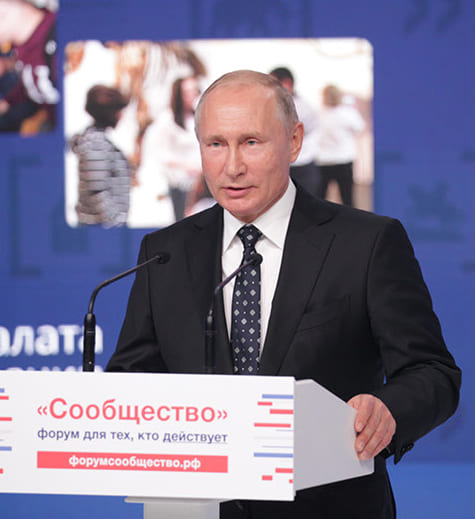
For the coming years, the implementation of national projects is the priority of the Russian state and society. National projects are not just a technical instrument and a list of growth indicators, they are a large-scale program for the country's development for years to come, which implementation defines our future.
As of November 2019, funds allocated for the implementation of national projects have been disbursed by 64% compared to annual values.111 Federal projects still have 6 out of 76 projects not implemented.112 Why was the implementation of such fundamentally important tasks for Russian society and the state so difficult?
Among the main problems are the lack of resources and budget funds for the implementation of investment projects in the framework of national projects, which is primarily due to the fact that the state continues to apply a monetarist policy, guided by the principle of "low inflation at all costs." Such situation hardly justifies the reliance on fully required state investments in national projects. Another problem is the low awareness of the population about national projects and the status of their transparency.
More than half of Russian citizens have not even heard that the state authorities are implementing some kind of national projects, and, only 7% of Russians understand what their meaning is.
Operational control of the financial implementation of national projects for the public is significantly complicated by the decision of the Government to exclude information on intermediate tasks from the passports of national projects, leaving only goals for 2024 and, accordingly, information on budget allocations in terms of federal projects.113 For the success of national projects, civil society should be directly involved in their implementation. Active involvement requires common ground and public-state approaches. The Civic Chamber of the Russian Federation, together with regional civic chambers, is working on collecting proposals on the implementation of national projects and federal programs at the local level to model and evaluate the consequences of the proposed solutions.
#Challenges of social policy
For the Civic Chamber of the Russian Federation, the fight against the poverty in the country remains one of the highest priority areas. This task is complicated by the serious structural problems of the Russian economy.
On May 23, the Civic Chamber of the Russian Federation held a round table on the topic “National Capital Market: problems and opportunities”, where discussed the opportunities and prospects for the effective development of the domestic capital market. It was noted that Russia still lacks a clear understading of the characteristics of the Russian financial market and its economy looks more like the economy of a giant kiosk: all you earn shall you spend.
Moreover, most of the money is concentrated in the budget. The hearings had proposals to make wider use of public debt as a financial instrument, an instrument of development. For example, regional bonds and municipal bonds should become a tool for the development of the municipal economy.
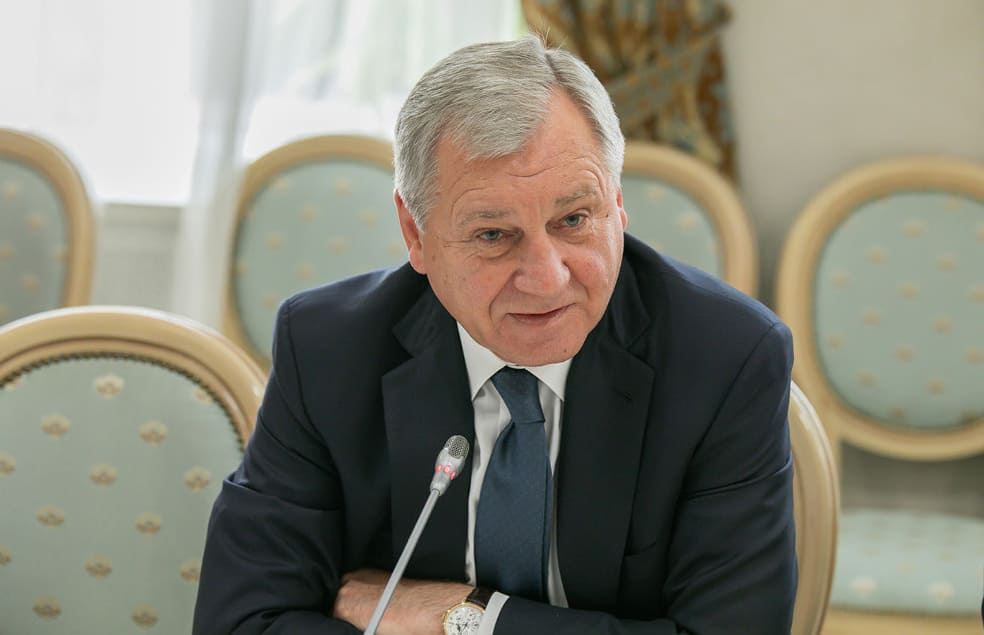
As is well known, active business activity makes a significant contribution to the sustainable development of the country's economy. However, sociological surveys state that 71% of businesspersons consider the business environment in Russia as unfavorable.114 This is associated with the risk of criminal punishment for economic crimes (Chapter 22 of the Criminal Code of the Russian Federation).
Up to 30.5% of petitions to the Businesspersons' Rights Commissioner for the President of the Russian Federation related to the criminal prosecution of businesspersons.115
On April 18, the capital of the Republic of Dagestan, Makhachkala, held a forum of the Civic Chamber of the Russian Federation. The topic was "Labor economy. Work places. Employment. It was observed that one of the ways to solve the employment problem in Dagestan could be the development of social entrepreneurship, which is still evolving in the republic. The Civic Chamber of the Russian Federation was one of the first organizations that began to talk about a fairer tax system. The implementation of a progressive taxation scale has not yet been discussed, but there is already talk about zeroing personal income tax for citizens who receive less than a living wage. There is also a serious problem with the employment offices in our country, as they need a significant updating of standards and can no longer provide people with quality services. Employers do not work with such inflexible structures.
The Civic Chamber of the Russian Federation is seeking ways to overcome poverty in this country. For example, the Civic Chamber of the Russian Federation supports the initiative to pay families a minimum living wage of a child, which should help to reduce the poverty of families raising children under the age of three. Moreover, in 2017, according to Rosstat, the income deficit of families raising children aged three is 210 billion rubles.116 This is actually more than 30% of the income deficit of all families with children, i.e. this is a significant share. But it is necessary to see that this benefit not only actively works to support the family, but also can be used to hire a babysitter if a mother returns to work. This will ultimately stimulate the economic employment of the population, the growth of welfare, family incomes and work not only to reduce the poverty, but also to achieve another goal of national development, i.e. increasing the income of families with children.
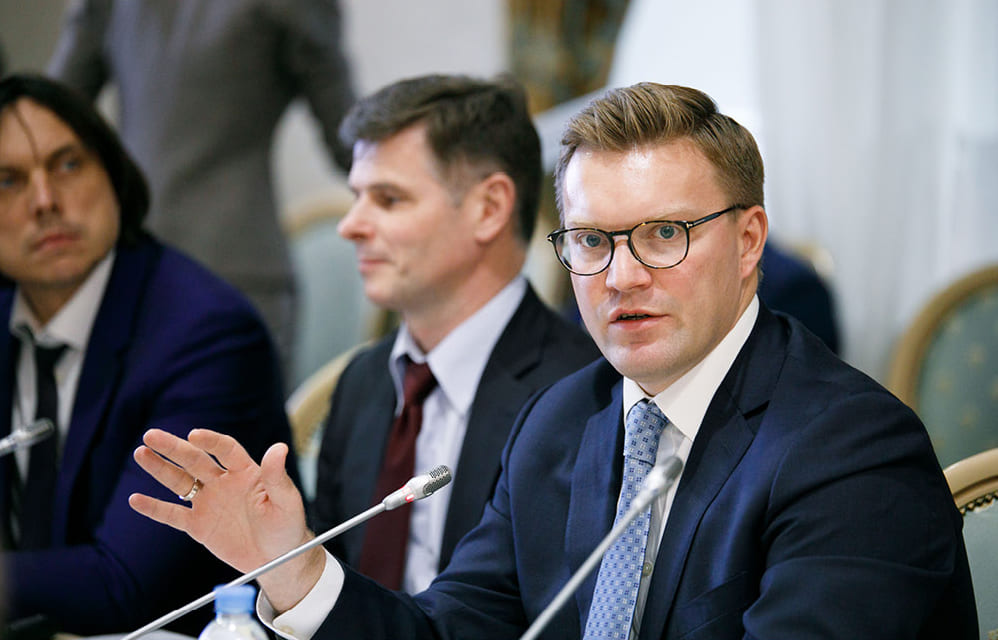
Regions with the highest income disparity
April 2019
Ratio of the median wage to average wage. The lower, the more a salary gap of the region's residents, %
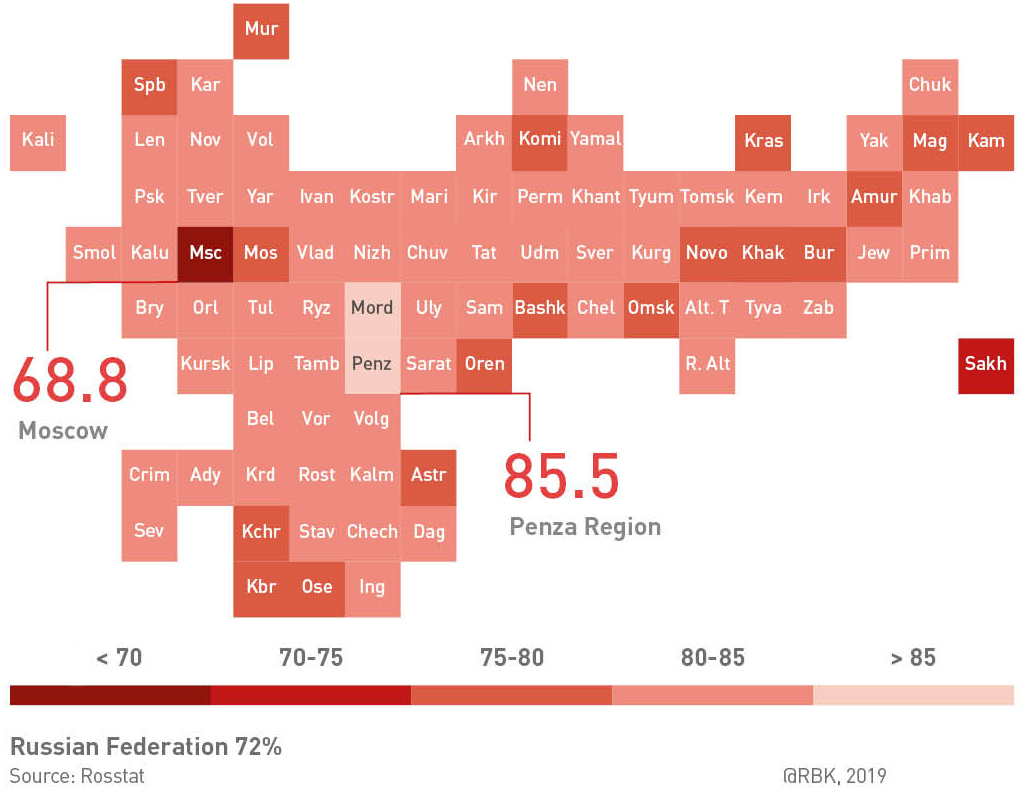
Source: RBK
Members of the Civic Chamber participated in a discussion on the results of a survey , conducted by the International Institute of Management of Businesspersons' Associations, on the problems of employment of pre-retirement, and employers risks associated with this. The members suggested strengthening the role of educational organizations in the implementation of the vocational training program and additional professional education for citizens of pre-retirement age.
The Civic Chamber has consistently advocated the strengthening of the civil society's role in determining policies to reduce inequality, promoting this agenda in the international arena. The international conference “From Inequality to Justice: International Experience and Solutions for Russia”, held by the Civic Chamber on December 10, 2019 with the participation of experts and representatives of economic and social councils from 43 countries, had wide discussions on the reasons of the high level of inequality in society and proposals for reducing it, taking into account the best world practices.117
#Ecology and quality of living environment
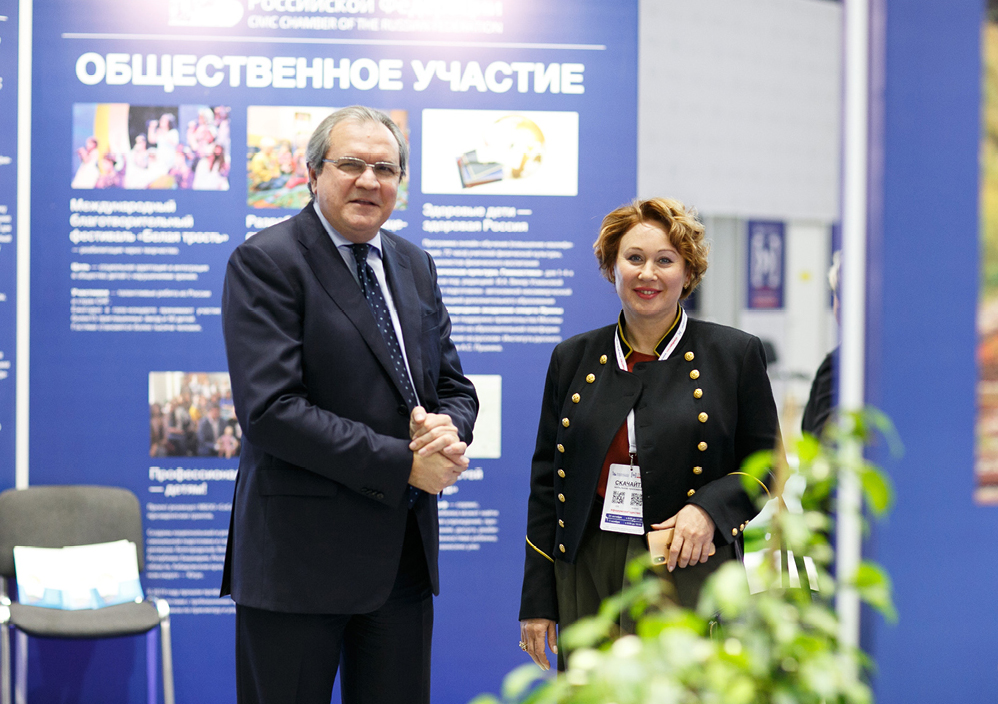
The Civic Chamber of the Russian Federation took an active part in the formation of the passport of the national project "Ecology". One of the main proposals, including the creation of a public law waste collecting company, has already been implemented as a part of the national project. The beginning of 2019, marked the creation of the Russian environmental operator.118 The main goals of such public law company is to perform social and administrative functions of organizing stable systemic work of the waste management industry during the reform period and in the future.
The main problems that the established public law company is already facing include the extremely low investment attractiveness of the industry and lack of public awareness of the decisions and processes associated with the construction of SMW processing facilities. Low public awareness leads, consequently, to social and environmental conflicts that undermine the credibility of the reform. Seeking a trade-off on tasks of authorities, investors, developers and the interests of residents in the construction of waste storage and recycling facilities is the main task of the public.
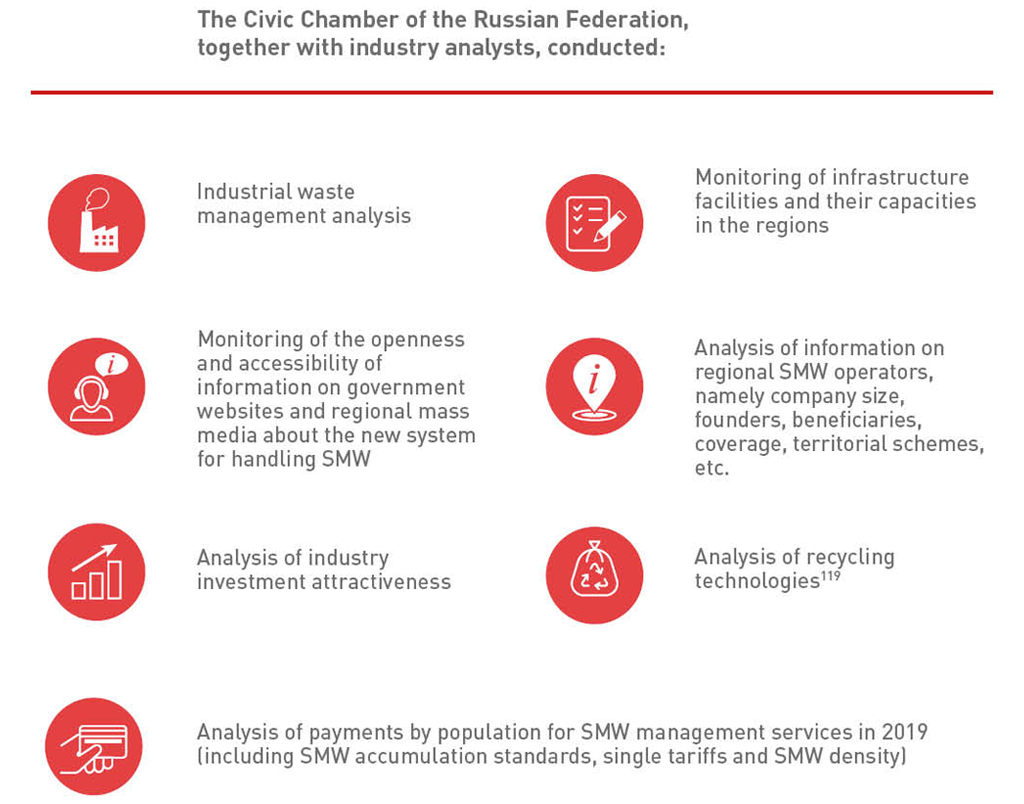
Meanwhile, while the implementation of the "waste" reform raises new questions. In 2019, many regions witnessed an increase in tariffs for households for the removal of solid municipal waste, although nothing has changed in terms of waste sorting and recycling, with waste still landfilled.
According to 16.2% of utility bills, the payment for SMW removal decreased, in 15.4% of utility bills the payment for SMW removal did not change, and in 68.4% the payment increased.120 For a significant number of citizens, the transition to a new SMW management system was a surprise. Citizens did not have enough information about the essence of the changes, the goals and objectives of the reform. There was no understanding why the payment changed and how it is calculated. In a number of constituent entities of the Russian Federation citizens are shocked with the inclusion in the tariff of an investment component that is funding the construction of new landfills, waste sorting, burning and recycling plants, which later become the property of private businesspersons (experts from the Tyumen, Moscow and Kirov regions drew attention to this).121
In 2018-2019, there were troublespots associated with the waste management procedures and the activities of regional operators to create waste disposal infrastructure. Since 2018, within preparation of the report to the President of the Russian Federation the Civic Chamber launched the mediation of social and environmental conflicts. One of the positive examples the Civic Chamber's activities in this direction is the resolution of the conflict around the landfill in the village of Malinki of the Moscow Region. Members of the Civic Chamber in a dialog with residents and authorities, managed not only to develop a new methodology for resolving conflicts, but also to stop the operation of a new-created facility. Since 2018, the Arkhangelsk Region and the Komi Republic have been rumbled with mass rallies, united by the motto “Pomorie not a dump!” The main reason for this conflict was the complete isolation of the public from the decision-making process on the construction of a SMW landfill near the Shies railway station.
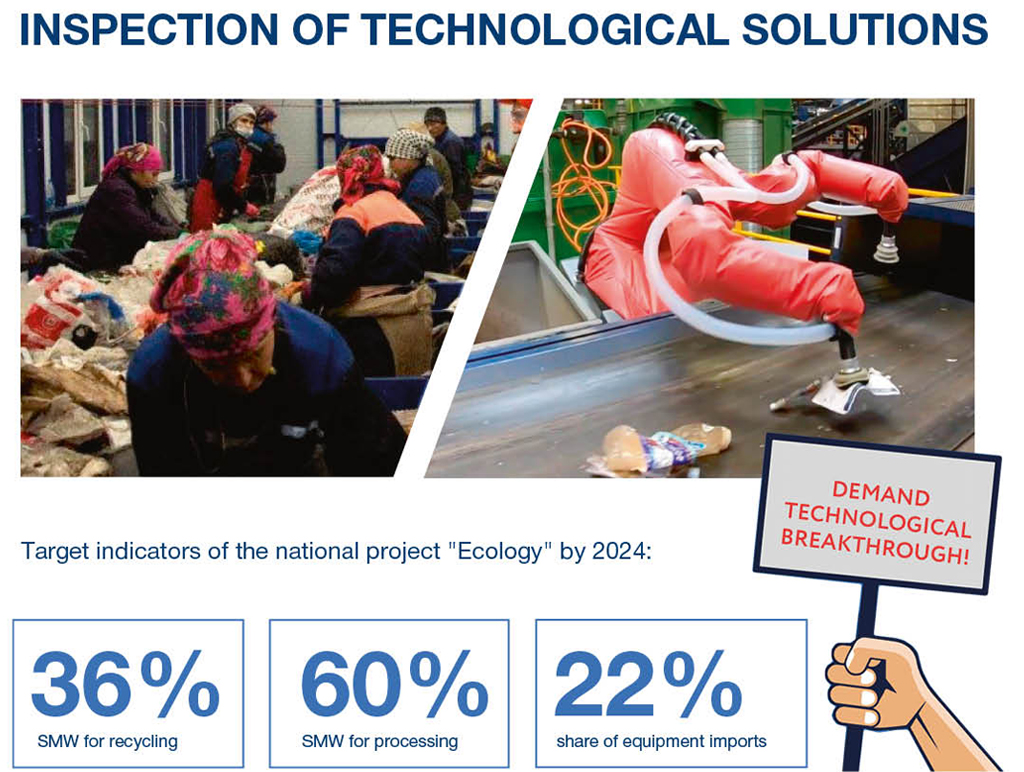
By the time the protests began in July 2018, no geological surveys, environmental project reviews, or public hearings were held. Some attempts to falsify public discussion by holding fictitious hearings in the village Urdoma were identified. Only with the intervention of the federal authorities in the conflict, and especially after the comment of the President V. V. Putin at the Media Forum of ONF (All-Russia People's Front) in Sochi on May 14-16, 2019, which instructed the authorities of the Arkhangelsk Region and Moscow to take into account the opinion of Pomorie's residents when deciding on the construction of the landfill. The authorities of the region, together with contractors, procrastinate to work with the mass media and the public to clarify the position.
In mid-June, preparations for the construction of a landfill were suspended and additional examinations and public hearings should be held. When working with the conflict in the Arkhangelsk region, the experts of the Public Chamber revealed loopholes in the legislation regarding public hearings and Federal Law No. 212-FZ “On the Basics of Public Control in the Russian Federation”, as well as proposals for their elimination were prepared. The Civic Chamber continues to collect proposals for highly efficient technological solutions as part of the implementation of the reform of solid municipal waste management. In 2019, the Civic Chamber of the Russian Federation published an “Audit of the Waste Management Industry”.
To date, experts do not see investment plans and development of waste treatment and disposal facilities. Now there is an adjustment of territorial schemes everywhere, and until this process is over, the design of high-tech facilities will not begin. The investment attractiveness in the industry is low, the risks for investors are very high. There is a notorious risk of protest activity, low payment discipline, sometimes artificially restraining accumulation standards and tariffs, as well as a large number of amendments to the regulatory framework.
And at the same time, the national project "Ecology" set targets indicators: By 2024, 36% of the waste is to be recycled, 60% is to be processed. To achieve these goals, the government should stimulate construction of high-tech facilities.
An equally important indicator is “the share of imports of equipment for the treatment and disposal of municipal solid waste”, which is planned to be reduced to 22% by 2024. Currently the Government is discussing the exclusion of this indicator.
During the audit of the waste management industry, experts of the Civic Chamber revealed a connection between tariff and technological solutions. The use of imported equipment, often outdated, with low efficiency and manual low-productivity labor, poses a threat not only to economic, but also environmental safety of this country. Home equipment can not only increase productivity, but also significantly reduce tariffs for the population for SMW services. The expert community insists that the exclusion of the target indicator “reducing the share of imported equipment to 22% by 2024” is unacceptable.
The main result achieved during 2019 was a change in the industry management system, and its transparency. Regional operators begin to work openly according to the territorial scheme and can show where and what waste transporting. Members of the Civic Chamber of the Russian Federation hold regularly field meetings in various constituent entities of the Russian Federation with representatives of the local self-government, regional operators and the public for an objective assessment and monitoring of the progress of the reform in the regions, and provide the regions with expert support in problematic issues.
One of the growing hotbeds of protest activity is the regimes of economic activity within the boundaries of special protected natural areas (SPNA) or adjacent to them.
Among the identified problems, people most often note difficulties with the construction and privatization of land and real estate, coordination of socio-economic and economic activities, construction of social and communal facilities, location of cemeteries, picking of mushrooms, berries, and the harvesting of firewood, and even the arrival of relatives subject to restrictions imposed on the area by SPNA. For the current year, only the Ministry of Natural Resources of Russia received 1,684 such complaints. According to preliminary estimates, SPNAs throughout this country are inhabited by about 2 million people (900 settlements), and in the absence of a constructive dialog, this issue may cause another social tension.122
Implementation of the federal project “Clean Air” by 2024 should reduce polluting emissions by 20%. There are plans to improve the environmental situation and reduce emissions of pollutants into the atmosphere in 12 industrial cities: Bratsk, Krasnoyarsk, Lipetsk, Magnitogorsk, Mednogorsk, Nizhny Tagil, Novokuznetsk, Norilsk, Omsk, Chelyabinsk, Cherepovets and Chita. The indicator of citizens' satisfaction with the state of the environment, which is scheduled for 2024, is impressive: it should run to 90%. How will it be done? Subjective factors and the methodology by which the dynamics of citizens’ satisfaction with the air will be studied become of great importance. Experts agree that reliable information on the quality of the environment will be available only when creating a unified information platform where air quality data will be posted, collected from various sources of relevant departments: all atmospheric air sampling that comes from the posts of Roshydromet, Rospotrebnadzor, and Rosprirodnadzor, as well as stationary and mobile stations of enterprises of the constituent entities of the Russian Federation.
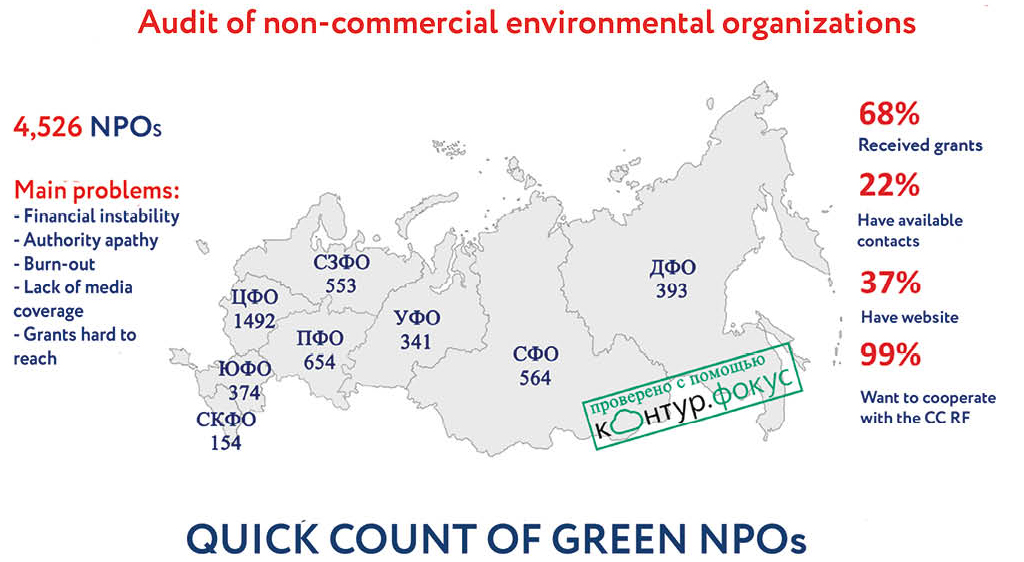
Government institutions, enterprises and the public should be connected to this integrated system. The Civic Chamber conducted an analysis of existing sources of information on the state of the environment and, for its part, offered the Ministry of Natural Resources of Russia assistance in organizing public monitoring of the population’s satisfaction with the environmental situation.
Among the most promising areas of work in the field of public environmental control are the activities of public environmental inspectors. An information resource created for effective work, coordination and exchange of experience of environmental druzhina was introduced in the Civic Chamber of the Russian Federation. Since 2018, the Civic Chamber has been working to create a register of environmental NPOs, during which more than 4,500 NPOs have been identified in the database of the Ministry of Justice of Russia, and about 1,000 of them participated in contests of the Presidential Grants Fund in the "Ecology sphere" (for 2017 and 2018). When forming the registry, it turned out that most organizations do not have websites, indicated outdated contacts, and many NPOs do not conduct any activities. In September 2019, the “roll call of green NPOs” was announced, and the main purpose of which is to update contact details and activities spheres. Based on the results of this work, it is planned to initiate the creation of a credible public organization uniting experts, scientists, activists and volunteers in the field of ecology, as well as the creation of a Code of Ethics for eco-NPOs.
The success of the reform is impossible without the responsible environmental thinking. Civic maturity is tested with the introduction of waste sorting (WS) in our cities.
It is assumed that waste sorting in Russia will be introduced, commencing from cities with a population of over one million, and the entire system for this initiative will be built from scratch. WS at the first stage will be organized on the principle of two containers: one for clean (dry) secondary materials, the second for organic contaminated (wet) waste. Resource saving should be the main principle of responsible environmental policy. An important contribution to the formation of this a policy is made by the All-Russian contest of best environmental practices “Reliable partner – Ecology”. The winner of the competition was the printing company "Komi Republican Printing House", which is headed by Anna Churakova, member of the Civic Chamber of the Russian Federation and the Civic Chamber of the Komi Republic. The key publication of the project was the new-generation book, “Fascinating Ecology, or the Boomerang Effect”, published in May 2019 by Natalya Melnikova and Natalya Gerasimenko.123
Another area is monitoring the implementation of automatic control systems for discharges and emissions of industrial facilities of category I, which have a significant negative impact on the environment, and creating conditions for the regions population to obtain reliable information on the state of the environment. The Civic Chamber regularly monitors the state of engineering infrastructure, including treatment facilities at the local level. To that extent, thanks to the persistent intervention of members of the Civic Chamber, Igor Shpector and Aigun Magomedova, it was possible to allocate funds for the overhaul and modernization of treatment facilities in Makhachkala and the simultaneous construction of the main sewer collector.
#Demography needs breakthrough solutions
Is it possible to ensure a steady natural increase in the country's population until 2024 within the framework of the existing “Demography” national project? Definitely not. This is the disappointing conclusion of the report of the Civic Chamber “Demography-2024. How to Ensure Sustainable Natural Population Growth in the Russian Federation”.
The report highlights that the new set of measures to support families with children, which was initiated in early 2018, did not fundamentally improve this situation. In January 2019, the Federal State Statistics Service recorded a decrease in the number of births by further 11% compared with the data for January 2018. The absolute number of children born decreased to the level of 2007, and the total fertility rate to the indicators of 2011.
This situation has an underlying cause related to the consequences of the demographic pit of the 90s and the decline in population incomes observed in recent years. Nevertheless, the previous success of state policy in the field of family support shows that the state is able to have a significant impact on the demographic behavior of the population. However, within the framework of the national project “Demography”, the planned 6-year increase in the total fertility rate at 1.6-1.7 means not just stagnation, but a deliberate weakening of the country's reproductive potential in current and in future generations, and the formation of a new “demographic pit” by 2040-2050.
From the point of view of the Civic Chamber, a radical revision of Russia's demographic policy is necessary. The birth crisis should be one of the main priorities for the country.
The Civic Chamber of the Russian Federation in the report "Demography-2024. How to ensure sustainable natural population growth in the Russian Federation” offers new measures aimed at supporting families at all stages of the life cycle. However, the main condition for a qualitative change in the current situation is the need to focus on multichild families.
But today, the main corpus (90% of investments) are support measures for the first and second children. Birth support of third and subsequent children is less than 10%, while in demographically successful countries this level is above 40%.
Within the framework of the national project “Demography”, it is necessary to develop a new federal project “A Multichild Country”, which should include support measures for multichild families initiated by the President of the Russian Federation V. V. Putin in the framework of the Address to the Federal Assembly of the Russian Federation of February 22, 2019, as well as additional measures based on successful regional and international practice.
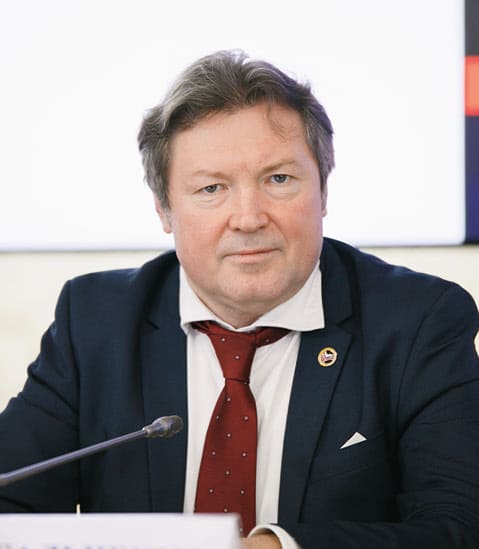
The Civic Chamber expects that the public outcry on this crucial issue will be heard and the national project “Demography” will be adjusted to implement the main task of the sustainable natural growth of this country's population.
Even those family support measures that are currently being implemented in Russia are not available to a major part of families with children. The Civic Chamber organized an online monitoring “Family Policy: support measures as viewed by families”.124
The monitoring goals were to identify the effectiveness and accessibility of currently existing measures to support families with children, as well as to collect comments from citizens on improving family policies and evaluate already proposed initiatives, e.g. All-Russian father's capital. In total 10,861 people took part in anonymous monitoring. Responses came from 83 constituent entities of the Russian Federation.
Less than half of support measures apply to more than 50% of respondents and can be considered successful. Basically, monitoring participants do not receive access to benefits due to lack of information or do not have rights to it due to the need to have the status of a low-income family. Respondents consider it necessary to establish a unified status of multichild families throughout Russia providing current regional benefits for residents of the Far East become available to all Russians. After indexing, the survey participants suggest the optimal amount of maternal capital in the amount of 550 thousand rubles Most of the respondents also supported the Paternal Capital project proposed by the Civic Chamber.
All-Russian survey
Family policy support measures as viewed by families” (10,861 respondents, 83 regions, August – October 2019)
| New public initiatives | Support |
|---|---|
| Paternal (family) capital | 74% (opposed 18%) |
| Flexible parental leave for children under age 1.5 | 70% |
| Family ticket 1 time annually | 70% |
| Benefits for each child in multichild families before reaching legal majority | 62% |
| Free higher education for children from multichild families | 55% |
Source: The Civic Chamber of the Russian Federation
Results of the monitoring “EVALUATION OF PUBLIC INITIATIVES IN THE SPHERE OF FAMILY POLICY”
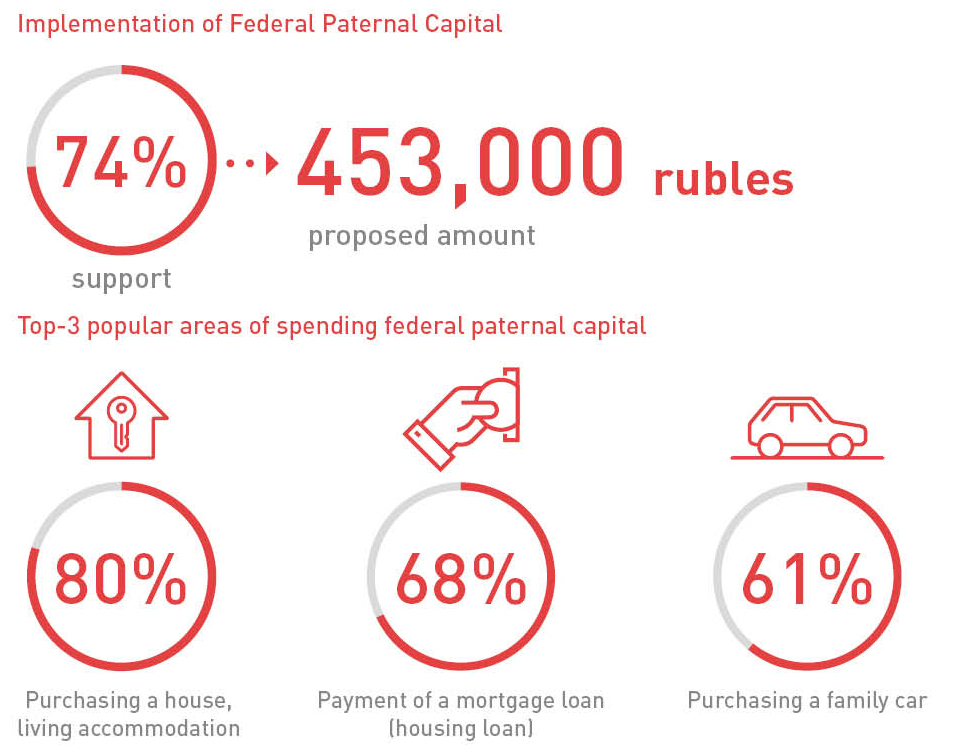
Source: The Civic Chamber of the Russian Federation
In general, the monitoring results revealed serious gaps in the implementation of the demographic policy of Russia, while citizens suggested their improving.
Separate federal projects in the framework of the “Demography” national project need to be reviewed with the engagement of relevant NPOs. To that extent, the bill “Promoting the Employment of Women — Creating Conditions for Preschool Education for Children under Age Three”, should see an alternative to the construction of a nursery, as certified babysitters, family kindergartens, and so-called private unlicensed kindergartens.
The Civic Chamber also takes the initiative to introduce flexible parental leave. The right to choose the duration of the vacation and adjust the amount of benefits will help to take into account the interests of a working mother. For example, instead of the current year and a half and 40% of the salary, to see a vacation for nine months and double the share of salary.
The Civic Chamber pays special attention to the “Decade of Childhood” plan, the implementation of which is directly related to the success of the demographic policy in Russia. Specifically actively discussed the possibility of volunteers to access hospitals to care for children (paragraph 88 of the plan). From the point of view of the Civic Chamber of the Russian Federation, these measures are not enough to ensure adequate children care and supervision. And this is confirmed by the monitoring of the Civic Chamber, which, among other things, evaluated the provision of the service “Nannies for Orphans in Hospitals”. It is necessary to improve the legal framework and expand the access of NPOs to the provision of social services to children.125
Also within the framework of the “Decade of Childhood” plan, the Civic Chamber is actively involved in the social orphanage preventive measures, family social support and reducing the number of troubled families. To see these practices a series of online training seminars was organized for babysitters, childcare providers as part of the project “Professional babysitters for Children!”.126 More than 200 babysitters from seven pilot regions of the Russian Federation during the five-day training course received knowledge and skills from leading experts in the field of early development and childcare. The project aims to implement the task set in the May decree of the President of Russia, in terms of creating conditions for the labor activity of women with children, including achieving 100% accessibility (by 2021) of pre-school education for children under age three.
The Civic Chamber actively monitored the situation with the organization of children's vacations in Russia. The project “Social Navigator”, organized by the Administration of State Projects of the MIA “Russia Today” and the International Public Fund “Russian Peace Fund” with the support of the Civic Chamber, annually collects data for parents to decide where to send their child to spend a summer vacation. In the summer of 2019, the navigator included 942 vacation programs implemented both in Russia and abroad. Also on June 26 the Civic Chamber of the Russian Federation launched a “hot line” to monitor the situation with children's vacations. In total 638 requests were received: 563 feedbacks from tourists (66% from Russia, 34% from abroad) and 75 petitions related to children's recreation. This season observed frequent cases of children poisoning in children's camps. For example, on July 22 in Crimea, the work of the children's recreation camp "Bereg" located in Alushta was suspended. There were ten children hospitalized due to poisoning. This case was provoked by pathogenic staphylococcus, the carrier of which were employees of the food unit. One of the reasons for such situations is a formal approach to personnel verification.
The Civic Chamber considers that interinstitutional commissions that check the camps before operation should be assisted by medical workers, who will take the necessary tests from the staff on the spot in order to give the real health status and give their opinion and access to the work of any employee.
The Civic Chamber makes proposals on introducing amendments to the legislation of the Russian Federation aimed at consolidating the status of a “multichild familiy”, as well as on sharing the experience of the Sakhalin Region on additional social support for multichild families. These changes are necessary to see the "Federal Law on Support for Multichild Families", which, with the active participation of civil society, will significantly improve the demographic situation in the country.
#Health of the nation: contribution of social initiatives
For five years, the Civic Chamber of the Russian Federation has supported a public initiative in the field of demography and health care to strengthen and preserve the health of young people, aimed at regulatory increasing of the age of alcohol sales in the Russian Federation to consumers under age 21, the so-called Law 21.127 The centre for the consolidation of public proposals and the creation of Law 21 was the federal project "Sober Russia".
The initiative on "Law 21" has fundamental support: For five years, the All-Russian Public Opinion Research Centre has recorded more than 75% of the citizens who are in favor. The attitude to the initiative in the responsible authorities is gradually changing. In particular even the Ministry of Finance of Russia considers it permissible to increase the age for buying any alcohol to age 21, although initially it has not supported the corresponding bill of the Ministry of Health of Russia.128
The Civic Chamber together with the federal project “Sober Russia” prepared Report on the Current State of the Anti-Smoking Legislation of the Russian Federation. The document identifies and compares the scale of the negative consequences of drug addiction and drug trafficking, and also assesses the new hobbies of young people, notorious hookahs and vapes, which are quite popular among adolescents. Among the proposals of the Civic Chamber is to oblige tobacco companies in the Russian Federation to disclose information on the composition of tobacco in their cigarettes.129
With the participation of the Civic Chamber of the Russian Federation, the "Regions Anti-Drug Rating – 2019" was prepared and introduced.130 The document identifies and compares the scale of the negative consequences of drug addiction and the drugs trafficking in the regions. The Civic Chamber noted the growth of such destructive phenomena as drug advertising on social networks and the spread of drugs through the Internet, prescription drug abuse, teenage substance abuse (sniffing). On this background, the state machine is often late with an adequate reaction to the emergence of new types of psychoactive and narcotic substances, new channels for their distribution. In this part, civil society and responsible citizens can greatly help the state, pointing out legislation loopholes and the imperfection of law enforcement practice in the fight against new threats.
An important contribution to the prevention of alcoholism and drug addiction among young people was the program “Sobriety Lesson”.131 This is a unique teaching instrument developed by the federal project “Sober Russia” and the Moscow Institute of Psychoanalysis with the support of the Civic Chamber.
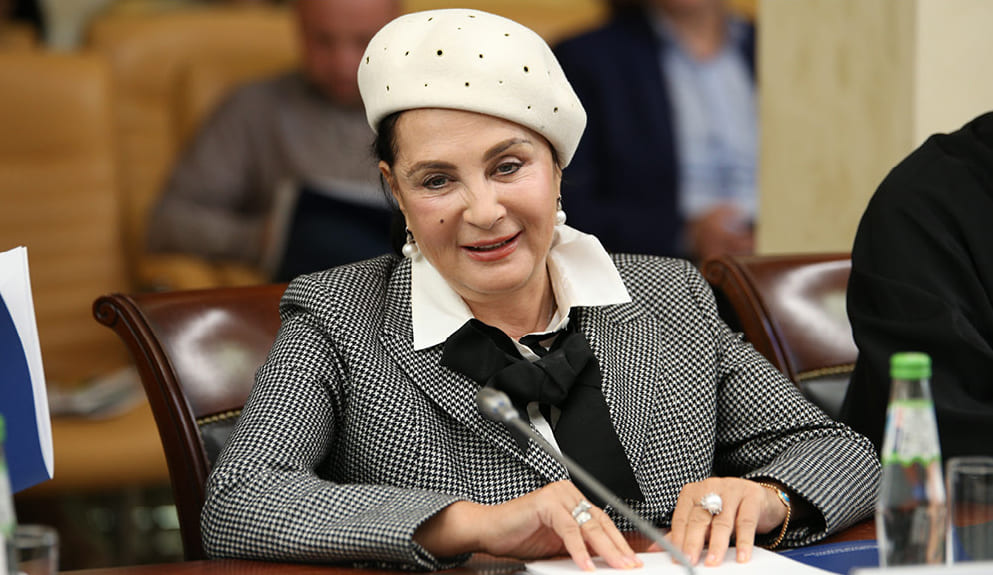
With the support of the Civic Chamber on World Health Day, simultaneously in more than 150 cities of all constituent entities of the Russian Federation, the all-Russian action “10 thousand steps to life” was held.
In Moscow, the action was held at VDNKh and attracted more than a thousand of people. The action "10 thousand steps to life" is based on the WHO recommendations to take 6 to 10 thousand steps a day to maintain a minimum of normal physical activity.
The Civic Chamber conducts annual monitoring of the implementation of the RLD complex (RLD – Ready for Labor and Defense). This year the analysis focused on the third stage of the implementation of RLD standards, namely, how this process progressing among the population aged 18 to 59. At the same time, the volunteers of the federal project “Sober Russia” monitor the state of sports facilities in all constituent entities of the Russian Federation, and how new near the house sports facilities are being built.132
In Russia 39% of population practice sports regularly. The state sets the task to run this figure to 55% by 2024. The Civic Chamber of the Russian Federation monitors the implementation of this goal through the federal project “Sport is a Norm of Life”, including in the regions of the Russian Federation.
The implementation of the instructions of the President of the Russian Federation on comprehensive improvement of the legislation on physical education and sports133, and the large-scale tasks of national and federal projects are slowing down. Often there is a lack of attention to public initiatives and the results of public control.134
Following the results of the proposals consideration and recommendations of the Civic Chamber, aimed at implementing the decisions adopted at a meeting of the Presidential Council on the Development of Physical Culture and Sports on March 27, 2019, The President of the Russian Federation gave instructions to the Government of the Russian Federation and to the heads of the constituent entities of the Russian Federation.135
An Important moment in solving the problems of implementing national projects is the preparation of specific action plans.
At the same time, there is still no public information on their list related to the federal project “Sport is a norm of life”; there are no plans to support existing information networks in the field of physical education and sports that have accumulated sufficient data potential for immediate use for state needs, including for information support, statistic etc. An example of such network can be an open information platform "Sports Russia".136
To achieve this main goal of the federal project aimed the so-called Law on Fitness Centers.137 To date in Russia, 7 million do fitness, but the fitness industry has problems, namely ensuring the safety of the process and specialists who do not have the appropriate education. To solve these tasks, the bill provided mechanisms for accreditation and the supervision of the quality of services.
During 2018-2019, the Civic Chamber of the Russian Federation held round tables and hearings on this issue. It was resulted in a “zero reading” of the bill and amendments to the corresponding law in 2019.138
Throughout a year, the Civic Chamber catalysed public discussion of the bill of interinstitutional program “Swimming for All”. This draft involves the formation of conditions (infrastructural, organizational and economic, scientific, methodological, etc.) for the encouraging in training and systematic swimming as vital and health, and as a backbone sport for the population of the Russian Federation of all age and social groups. The Civic Chamber consistently advocates the introduction of comprehensive training in swimming and gymnastics.
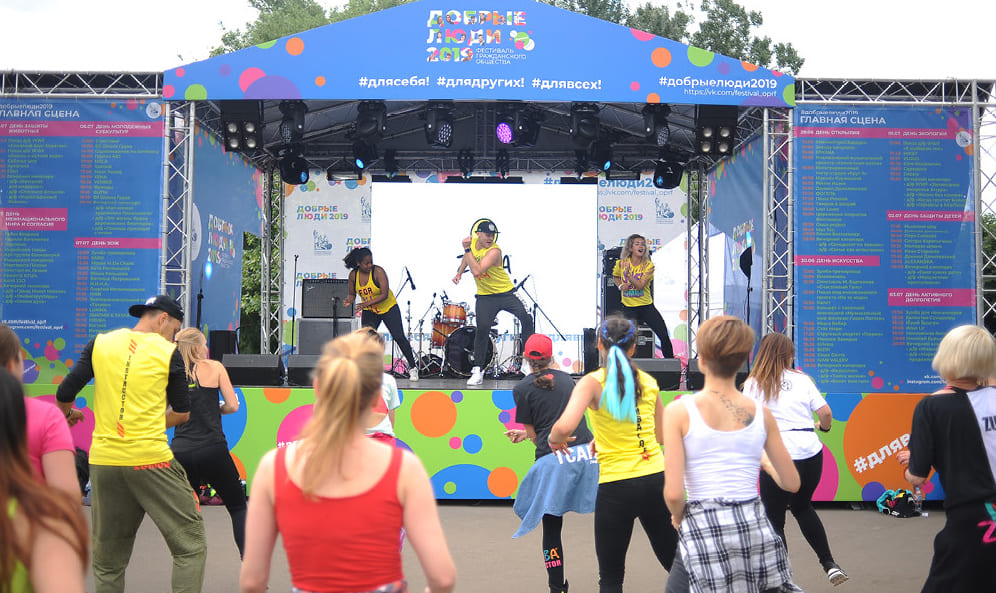
Realization of development goals is impossible without the introduction of modern standard projects for sports and recreation centers that provide certain services that can be used by various groups of the population, and most importantly geographically accessible. The Civic Chamber engaged representatives of sports federations at the perennial basis, because their voice is often not taken into account in the design and construction of sports facilities.139

The Civic Chamber has also made proposals in the field of medical tourism in Russia and regarding the capabilities of Russian resorts to solve key national problems in the field of physical education, sports, public and corporate health.140 Many hotels and health resorts have facilities for fitness or wellness centers. But often they are in free use, and the working staff there only give general advice. The Civic Chamber considers it possible to create and develop rehabilitation centers for professional athletes and citizens involved in active sports based on Russian resorts, as well as develop standards for wellness services specialists.
Today the physical training and sports section or healthcare do not have professional standards for specialists how to provide wellness services. Their development and application will help to set the standard for such services and improve their quality.
There is a pressing need in staffing of the sports sector: From 2015 to 2017, the number of trainers fell from 98 to 92 thousand people, the number of trainers of the highest and first categories decreased by 19%, i.e. according to statistics of the Ministry of Sports, from 35 to 29.8 thousand people. Trainer's financial support is often passed on to regions that do not always compensate these additional payments that have been lost during the transition from education to sports. In this case, this is also a matter of adjusting regulatory support. In particular, the preparation of the professional standard “trainer-teacher” was disrupted. It resulted in non-enrollment of students in this specialty for the current academic year.141
#How ensure accessibility and quality of healthcare
The Civic Chamber held the round table named “Insurance principles of compulsory medical insurance are the guarantee of the social rights of Russian citizens” where the report on the economic efficiency of the insurance model titled “Analysis of the status of insurance medicine in Russia and its prospects” was discussed. Participants of the event recognized that the existing system of compulsory health insurance is optimal and effective and there can be no return to the budget model. The main direction of its improvement can be an irreversible movement toward the path on the development of insurance principles and a phased transition to a risk model. Additionally, it was proposed to include liability of medical professionals in the compulsory medical insurance (CMI).142
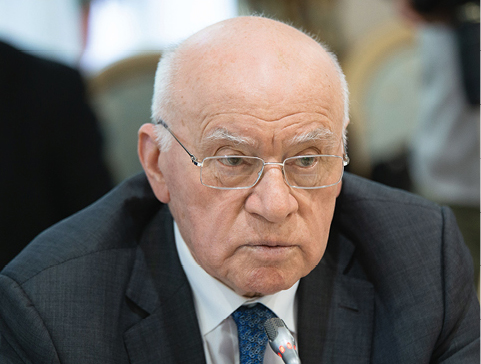
The Civic Chamber discussed the situation with the routing of patients to high-tech medical care (HTMC). Today, to contact, for example, the Bakulev center, the patient must receive a referral at the place of residence. But constituent entities of the Russian Federation, due to the difference in the rates of CMI, impose restrictions on the volume of aid; consequently, residents do not always have the opportunity to receive timely high-tech care included in the CMI.
The availability of healthcare is also associated with the development of telemedicine and mobile complex. In this area, the experience of public-state and public-private partnerships play a significant role. The Civic Chamber's platform demonstrated mobile complexes based on the "GAZelle NEXT". Such complexes help medical professionals conduct large-scale diagnostic examinations in the regions of the Russian Federation.143
The Civic Chamber also proposed ways to improve the social and medical support of residents of closed administrative-territorial entities (ZATOs).144
The Civic Chamber annually hosts large forums within its platform of the patient community. The Civic Chamber held the 11th Forum the Movement Against Cancer, where participants declare the fight against cancer is the most significant component of the national project "Healthcare" until 2024. The forum traditionally resulted in the address to the President of the Russian Federation on the program for the implementation of civil monitoring of the oncology service as part of the implementation of the national project to combat cancer.
The Civic Chamber discussed in detail the role of charitable foundations in solving problems with providing vital and essential medicines, which are included in the list approved by the Government of the Russian Federation. Providing citizens with such medicines is currently referred to the authority of state authorities of the constituent entities of the Russian Federation.
The regional budgets bear a significant financial burden, as the cost of medicines is high, and this limits the regions to comply fully with their obligations. Another problem, which solution requires a dialogue with the authorities, is connected with the medicine assistance to orphan patients. It was proposed to expand the system of neonatal screening and “Seven High-Cost Nosologies” the state program (the so-called 7 HCN: hemophilia, mucoviscidosis, multiple sclerosis, etc.), which provides the patients with medicines at the expense of the federal budget. It is proposed to introduce federal funding for the treatment of such diseases and provide federal medical centers with the right to prescribe this treatment and observe its dynamics.
The Civic Chamber together with relevant experts at the hearings on amendments to the legislation on palliative care strongly advocated the expansion of the interpretation of palliative healthcare (PHC) by including social, psychological and spiritual care in this concept.
By means of joint effort, the concept of palliative care in the bill was supplemented by a set of measures, including medical intervention, psychological measures and care measures.145
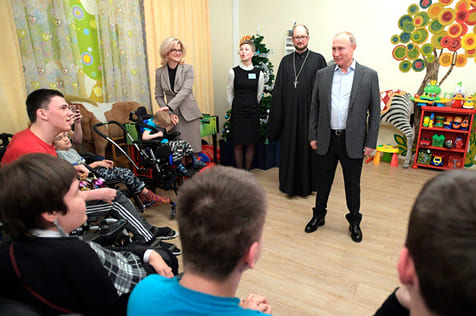
In 2019, the Civic Chamber's activities include, a new area of work appeared - the development of bone marrow donation. In January 2019, at the open Blood Donor Day in the Civic Chamber of the Russian Federation, employees of the National Medical Research Center for Hematology of the Russian Federation of the Ministry of Health of the Russian Federation collected typing results for entry into the Federal Register of potential bone marrow donors, which is creating with the support of medical scientific research organizations.
In addition, the 2019 was marked by the signing of the memorandum “On the Coincidence of the Interests of the Charitable Foundation 'Rusfond', the Civic Chamber of the Russian Federation and Presidential Council for Civil Society and Human Rights in Bone Marrow Donation”.146
The Civic Chamber expects that the creation of a national bone marrow registry will be considered at level of a national task and this task will be solved at the state level.
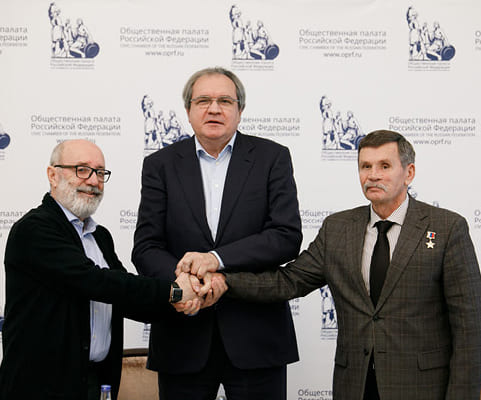
#Accessible environment for everyone – imperative
Among the "hot lines" of the Civic Chamber of the Russian Federation, two are working on the accessibility of higher education for young people with disabilities and on the creation of a modern system of comprehensive rehabilitation and habilitation of people with disabilities and children with disabilities.
The “hot line” on accessibility of higher education for young persons with disabilities is aimed at monitoring the enforcement practice of the implementation of Art. 71 of the Federal Law “On Education in the Russian Federation”, which entitles disabled applicants to the budget at a ten percent quota to submit documents simultaneously to five universities for three specialties in each.
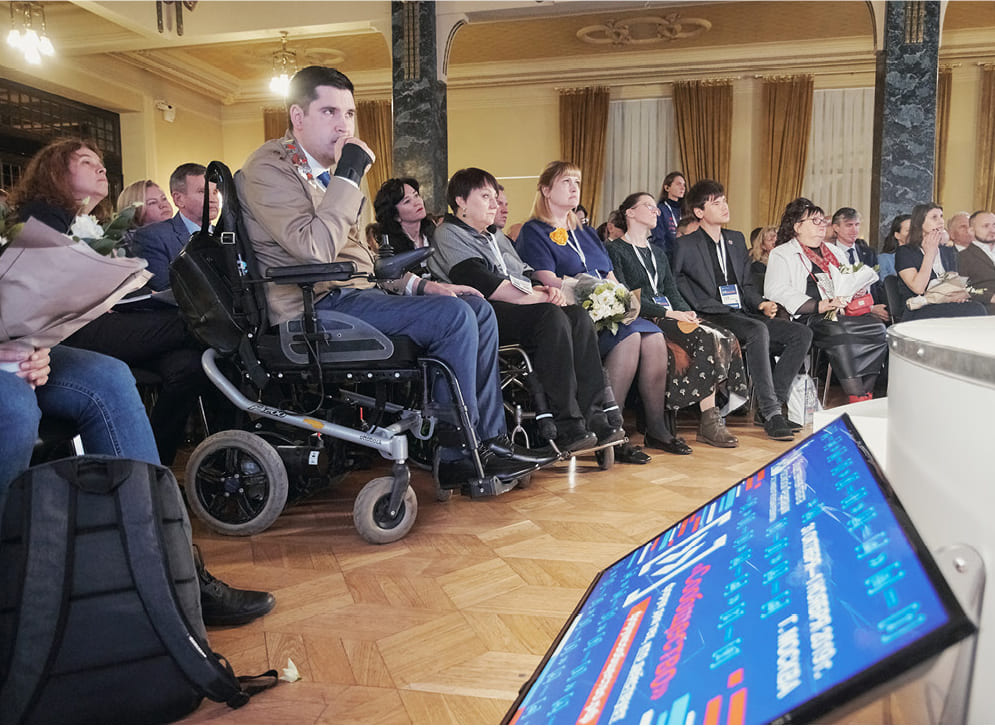
The second “hot line” is aimed at helping to ensure the rights of persons with disabilities to rehabilitation according to an individual rehabilitation and habilitation program (IPRA), the opportunity to find high-quality rehabilitation services in their locality or region, and providing timely and appropriate quality rehabilitation equipment (RE) and much more.
This "hotline" was launched for the first time and its activities are assisted by a working group on comprehensive rehabilitation under the Presidential Commission of the Russian Federation for Disabled Persons.
Accessibility of the environment for disabled persons should be ensured in any home and institution. It is necessary to build appropriate elevators and ramps, create the necessary conditions in public places, and check the availability of the environment.
The Civic Chamber paid attention to the problem of organising parking spaces for persons with reduced mobility (HIA). In September last year, new rules for the issuance of signs "Handicapped" for drivers were introduced. They now indicate the region code, personal number, surname, name and patronymic of the disabled person, information from the certificate confirming the benefit, disability group and the term of the sign. However, there are still situations where disabled persons cannot park the car where they can do it under the law.
The Civic Chamber supported the consolidated position of social activists on the need to create a universal system and an information array on vehicles owned by disabled persons. This system will allow people with disabilities to ensure their right to benefits nationwide.147
The position of the Civic Chamber was supported by the legislator, and the problem of accessibility of parking spaces for disabled persons was largely resolved in the amendments to the Federal Law “Concerning the Social Protection of Disabled Persons in the Russian Federation” adopted this year.148
To some extent, travel services, which must be considered as an intensive form of social adaptation of disabled persons, remain largely inaccessible to disabled persons. There are more than 10 million disabled persons in Russia. Most of them practically do not travel. For 70% of them, travel is not financially available.149
The "Community" forum in Makhachkala, demonstrated the results of a study on problems of employment of disabled persons. According to the study, the employment rate among disabled persons in Russia is only 17.2%, while there is a high increase in motivation to work, i.e. 32% of respondents would be willing to work under certain conditions and another 39% are searching for job.
Among the identified problems: Training in professions that are no longer in demand on the labor market, as well as various abuses by employers, such as offering employment under the book with associated risks; the creation of special enterprises for people with disabilities in order to receive support from the state and stop activities; preference to pay a fine rather than looking for a worker with a disability; formal rather than a real employment with the payment of the lowest salary.150
The problem of integrating disabled persons into society is acute. The activities of the Center for Sociocultural Rehabilitation of Diana Gurtskaya, which opened in Moscow in 2018, are devoted to solve the problems of socialization of disabled persons by means of art.151
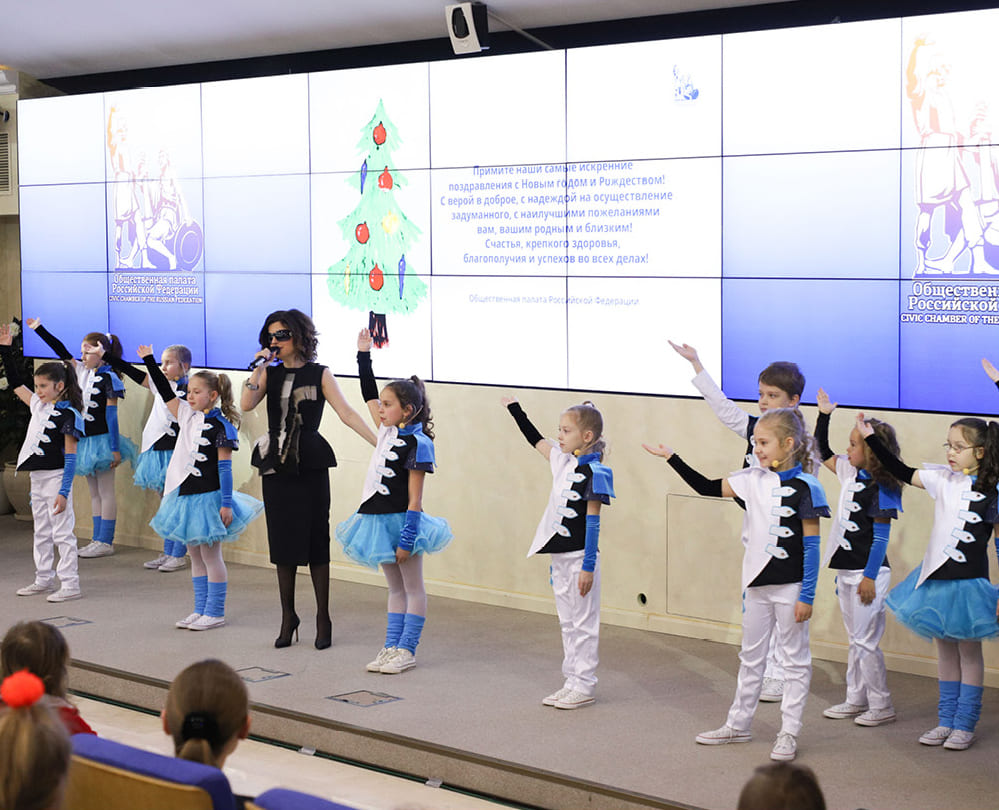
Russia has successful experience in implementing sociocultural projects such as “White Cane”, “Abilimpix”, Paradelphic Games, “Inclusive Moscow”, “Cinema Without Barriers”, “Ariadne’s Thread”, “Accessible Museum”, “Tactile Zoo”, inclusive theater. Certainly, there are more implemented and required projects. Often, the unique programs and practices of socio-cultural rehabilitation of disabled persons, implemented in the constituent entities of the Russian Federation by groups of committed professionals, do not receive proper media coverage and state support.
In order to share the best practices aimed at promoting the full participation of disabled persons in society, developing their creative and intellectual potential, forming a socially active person, a member of the Civic Chamber Diana Gurtskaya organized a competition of programs and practices for the social and cultural rehabilitation of disabled persons. In total, the competition received 250 practices in seven categories, revealing the main tasks in the field of socio-cultural rehabilitation of disabled persons.
In the framework of a joint conference of the Civic Chamber and the Federation Council, the role of non-profit organizations in the implementation of projects for the socio-cultural rehabilitation of disabled persons, and in particular the problem of access to public sports facilities for people with disabilities, was examined.
#Care for those in need: improvement of the PBS system
The Civic Chamber discussed throughout a year initiatives to bring patients of psycho-neurological boarding schools (PBSs) to the assisted living, and to organize hospital-replacing forms of social services for them.
According to experts, the assisted living for people staying in psycho-neurological boarding schools should begin not only by studying the work of the PBSs themselves, but also by providing housing, infrastructure, employment, training opportunities etc.152
An interesting approach to the issues of living with disabled persons was suggested by Maria Lvova-Belova, a member of the Civic Chamber of the Russian Federation. She represented the project "Novie Berega": a settlement, which is currently being built in the Penza Region, is a town of 12 buildings residential buildings, shop, chapel, educational centre, bath-and-health complex, cinema and business area with a car fleet and convenient recreation areas, paths and squares that correspond to the best practices for equipping houses for living. All that according to a universal design, everything is adapted for disabled persons.
A similar project is a socio-therapeutic village of the family type "Otradny Sad". The project was implemented in the village of Talovka, Pribaikalsky district of the Republic of Buryatia. The village was created as an alternative to the traditional education of children with disabilities and neuropsychiatric special boarding school.153
The Civic Chamber of the Russian Federation holds expert workshops on the diagnosis of mental disorders. For example, a seminar with international participation "Modern diagnosis of mental disorders: ICD-11 (international classification of diseases of the 11th revision)”, demonstrated the possibilities of practical application of the new diagnostic tools.154 Russia is one of the first countries to host such educational event combining lectures and practical training on the application of the new classification.
The Civic Chamber discussed effective practices of private-public partnerships in the field of organizing the assisted living of children undergoing long-term treatment in health facilities at the round table of the same name. Its participants considered the initiative to build free family-run hotels for parents with children undergoing treatment in large medical institutions in Moscow.155
There is a legal basis for providing quality assistance to disabled persons in this country. At the same time, the system remains quite outdated and does not meet the requirements of a social understanding of disability.
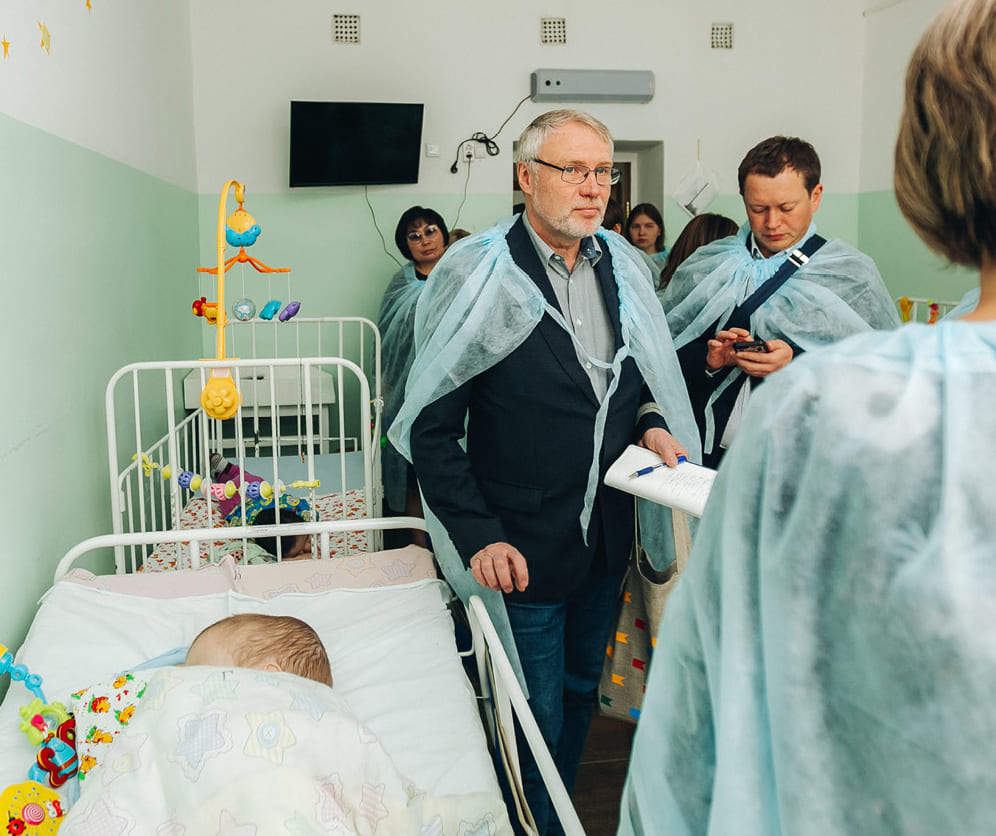
That is why, children and adults with intellectual disabilities being in stationary institutions of the social protection system, continue to pass from a baby nursery to a neuropsychiatric special boarding school, with no chance of integration into society.
On behalf of the Deputy Prime Minister of the Russian Federation on Social Policy T.A. Golikova to conduct a survey of people living in PBSs, from April to September of this year, 150 thousand citizens living in 500 PBSs of the country were examined.156 The Civic Chamber actively supported this work.
For two days on the eve of the "Community" forum in Arkhangelsk, Natalya Kiryukhina, a member of the Civic Chamber of the Russian Federation, representatives of the charity fund “I am!”, experts from RBOO Center for Clinical Pedagogy, charity fund “Lifestyle”, and SPb BOO “Perspektiva” monitored quality of life of people living in PBSs and other social institutions. The goal was to assess the living conditions of people in PBSs in terms of all compliance with standard human needs, as well as from the point of view of further positive development and resources (staff, material, etc.) which are not enough to create such conditions.
#Where we will live: housing and comfort urban environment
The target indicators for the national project "Housing and Urban Environment" are extremely extensive and ambitious. According to the passport of the national project, it is necessary to achieve the following indicators by 2024:
- to increase commissioning of new housing from 75.3 million square meters in 2018, up to 120 million square meters per year;
- to ensure improved housing conditions for 5 million citizens;
- to decrease the average level of mortgage rates up to 7.9%;
- to increase the number of loans issued from 1.1 to 2.26 million.
How will the citizens be provided with affordable housing? What tools, besides mortgages, can be offered? Apartment buildings (AB) or private housing projects (PHP) – what should be bet on? Is it possible to reduce the cost of houses under construction? Finally, what should be the housing policy in Russia and is it possible to share the successful experience of the “advanced” regions to other regions of the country?
The most important condition for implementing the goals of this national project is the expansion and differentiation of satisfaction forms of citizens' housing needs, including depending on the level of the need (mortgage, rental housing, or subsidized rent).
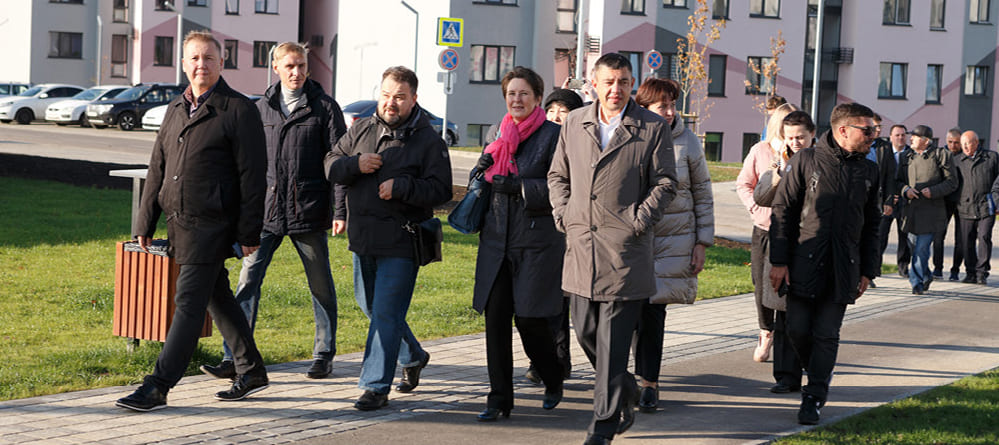
According to surveys, at least 70% of people want to live in individual houses, however, the entire construction industry today is up to build multi-family residential buildings.157 As a result, people dream of having their own home, but are forced to dwell in small-sized apartments. It is important to note that a small space in a multi-storey house limits opportunities to create a large, multichild family and comfortable conditions for three or more children. The goals of housing policy are correlated in this part with the demographic goals of national development: a small house – a small family, a large house – a big family. The development of private housing projects can help solve the key demographic problem for our country and preserve the cultural code of our people. Following the discussions, the Civic Chamber considers the following ratio of commissioned housing to be optimal: 80 mln. sqm. – AB and 40 mln. sqm. – PHP.
Proposals for specific measures of state support for private housing are formulated based on public opinion polls, ranking of the country's regions for the development of PHP, per capita, as well as the results of the thematic sections of six forums of active citizens “Community”, conducted in federal districts by a member of the Civic Chamber Leonid Shafirov.158 The following priority co-financing from the federal budget of the best regional, municipal programs for the development of PHP, the creation of federal, regional and municipal project offices (centers of competence) to provide individual developers with a full range of engineering, legal, consulting and other services, the creation of federal portal USIA "Gosuslugi" of super service "Svoi Dom", as well as the unified federal Internet portal (with regional annexes) containing information on land plots for PHP, which can be obtained free of charge or for a fee from all regional and municipal authorities.159
According to statistics, the cost of housing construction is only a third; the remaining two-thirds are interest on loans, taxes, payments for connecting to communications, land, etc. An additional cut-cost of housing can be found in allocating of expenses for the design and construction of engineering infrastructure, preparation of documents for connecting to infrastructure, to government spending, reducing tax burden, raising preferential project financing for construction work and forming a base of standard projects.
The Civic Chamber focuses the federal project “Formation of a Comfortable Urban Environment”160, since its target indicators include not only an increase in the share of cities with a favorable urban environment, but also an increase in the share of citizens participating in resolving issues of urban development. Thus, one of the most important goals of the project is the formation of an active urban community. It is very important that this task must be accomplished, and not turn into profanity or imitation of public participation.
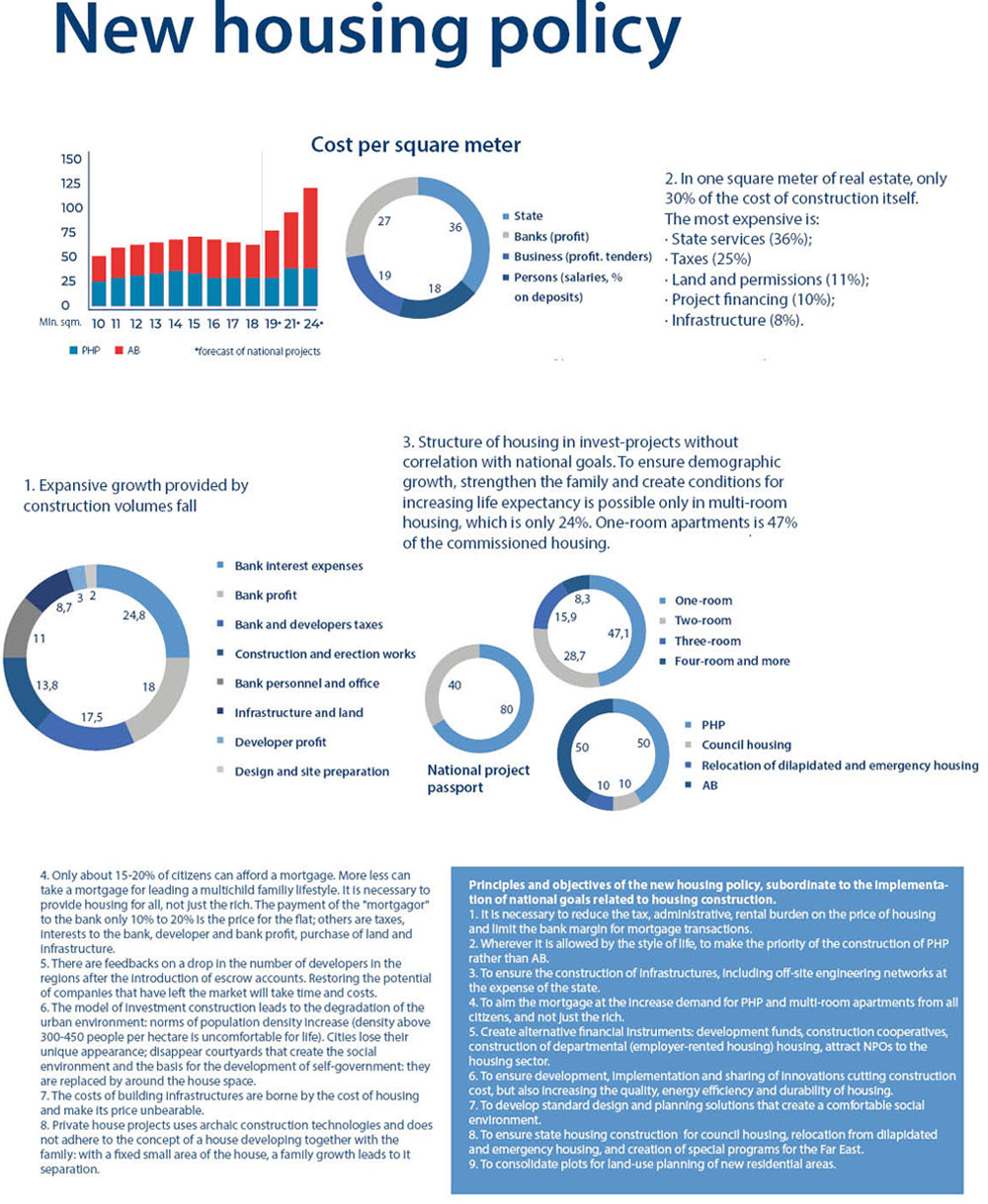
The Civic Chamber of the Russian Federation is carrying out a great deal of work together with the State Corporation “Fund of assistance to reforming housing and communal services”. Thanks to the efforts of members of the Civic Chamber, many issues related to emergency housing are resolved quickly and locally. By October 1, 2019, members of the Civic Chamber within the framework of public control of the implementation of national projects visited more than 150 settlements in 35 regions of this country. Meetings are held with the participation of senior officials of the regions, heads of municipalities and interested non-profit organizations. Each on-site meeting includes studying of on-site problems related to the operation of heat supply systems (thermoelectric power station, hydroelectric power stations, boiler houses), water supply, wastewater, sewage and sewage treatment plants. Also in regions the Civic Chamber checks the implementation of capital repair programs and the work of homeowners organization, checks the operation of utility metering stations, checks the quality of newly built housing and gives relevant recommendations, considers issues related to the construction of railways and highways of federal, regional and municipal importance, improvement of both public spaces and courtyards, as well as issues of processing and disposal of solid municipal waste, tariff regulation of communal resources.161 For example after an in-field event of the profile commission in the Pskov Region on the demolition of emergency housing, as well as the status of the housing and communal services and housing infrastructure, the Chamber addressed to the President of Russia. Since 2017, members of the Civic Chamber have been communicated with the Government of St. Petersburg regarding the reconstruction of Bogatyrsky Prospekt. Addressing to G.S. Poltavchenko (Governor of St. Petersburg until October 2018), then to the Acting Governor of St. Petersburg A.D. Beglov. As a result, work on this site was taken under special control, and to date Bogatyrsky Prospekt, located in the districted with population up to 300 ths. of Petersburgers, has opened for passage.
The Civic Chamber regularly holds events on topical problems of the industry, such as the introduction of information technology in the accounting system for communal resources and the regulation of engineering systems of the municipal infrastructure of cities, the shift of heat supply to cities to a closed system, new technologies for energy-efficient overhaul and insulation of the facades of apartment buildings, the reform of the elevator facilities.162
Serious criticism of the public was caused by the methodology for calculating the urban environment quality index, approved by order of the Government of the Russian Federation in March 2019.163 Despite the modest name, this is the most important document. Notably this method is the tool for assessing the effectiveness of the implementation of the federal project "Comfortable urban environment". The document not only allows to determine the current state of the urban environment in a specific municipality, but based on the given indicators, all-Russian city ratings will be annually formed. The method has 36 criteria, reflecting, according to the plan of the developers, the quality of the urban infrastructure, the environmental situation, the safety of living, etc. The draft of the methodology has been criticized by the Civic Chamber of the Russian Federation.
The “Methodology” has a lot of controversial criteria that can be quite unfit to reflect the quality of life of citizens. Most importantly, among the proposed criteria, there is a need in those that reflect the city's job status, social infrastructure status, i.e. number of kindergartens, schools, hospitals, as well as the implementation of housing programs and many other things that make the city truly attractive for life. The Civic Chamber's experts insisted that the methodology should become an integral indicator reflecting the implementation of various national projects within a particular territory. When developing the new methodology, some comments of the Civic Chamber and other public institutions were taken into account.
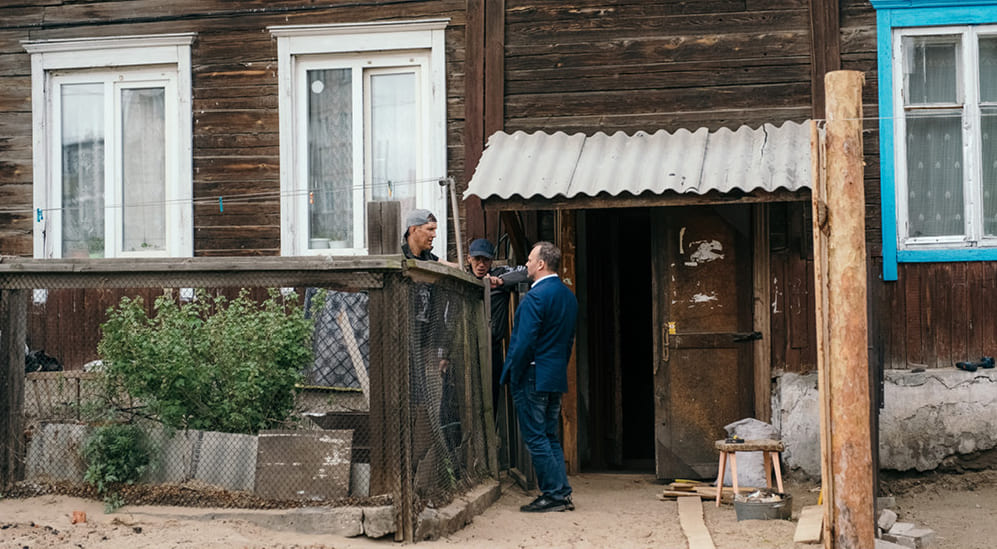
Since 2008, this country has been implementing a large-scale program of resettlement of citizens from emergency housing under federal financial support provided to the regions by the State Corporation “Fund for the Assistance of Reforming Housing and Communal Services”. Over a 10-year period, 1.04 million citizens were moved from emergency houses, whose area is almost 16 million square meters. During this period, 99.4% of housing recognized as emergency by January 1, 2012 was resettled. It is assumed that by 2024 there will be no housing recognized as damaged by January 1, 2017.
Along with it, there are a number of problems that the Civic Chamber of the Russian Federation has repeatedly indicated. One of the main requirements is to establish unambiguous criteria at the federal level for the protection of the poor citizens when relocating from emergency housing.
Unfortunately, the bill developed by the Government provides guarantees for the provision of new housing in exchange for emergency housing only for those who live in dwelling under a contract of social rent. The owners of an emergency housing, are subject only to the redemption price payment mechanism. In addition, such price in most cases does not allow purchasing a new full-functional housing instead of an emergency one.
In order to solve these tasks, the Civic Chamber suggest developing and using of uniform housing standards when recognizing citizens in need of housing support (minimum housing standard) and providing such support (housing standard) throughout the country, as well as centralized personified registration of such citizens.
#Public control of spatial development: the National Program for the Far East
When implementing strategic state tasks and national projects, it is important not to focus on the development of agglomerations or large cities, but to find ways, resources and potential for the development of territories of each type. In February 2019, the Government of the Russian Federation approved the Spatial Development Strategy of the Russian Federation for the period until 2025. The bill of the strategy was discussed by the Civic Chamber in 2018 and was criticized for containing an unreasonable emphasis on the development of only large cities. Civil society activists insisted on the mechanisms that ensure social, infrastructural and economic development of small towns and villages. Small towns should be considered as resource centers for the development of the surrounding countryside, as a key infrastructure node.
At the end of 2018, the President of Russia gave instructions to the Government of Russia to develop a National Program for the Development of the Far East until 2025 and for the future until 2035. For the first time such documents say that this should be done in cooperation with the public and the business community. Regional civic chambers have been actively involved in the development of this national program.
The development of this national program consisted of three stages: 1) conducting public discussions in each municipality, summarizing proposals at the regional level and negotiating them with the legislative body of the region; 2) work in 25 working groups in the main areas of economic and social development, which included representatives of all regions of the Far Eastern Federal District; 3) a synthesis of all proposals by region at the federal level. Along with it, citizens may make proposals via a special website http://www.dv2025.ru/, where registered about 17 ths. proposals.164
The Council of the Federation, the State Duma, business communities and public associations also actively participated in the preparation of the national program. At the same time, the Civic Chamber of the Amur Region implemented its initiative to launch an interactive resource “Map of Problems”. This map can systematize local problems reported by citizens. The solution to such problems, which amounted to about 14 ths. is possible by the forces and means of local authorities, without engaging resources of the national program.
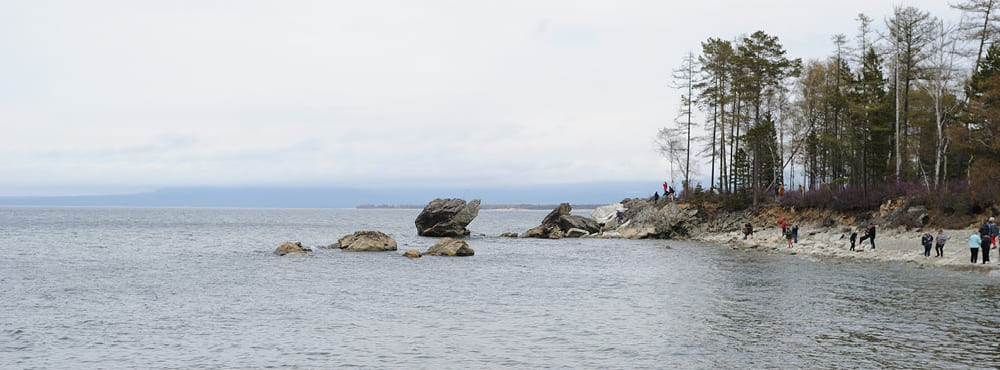
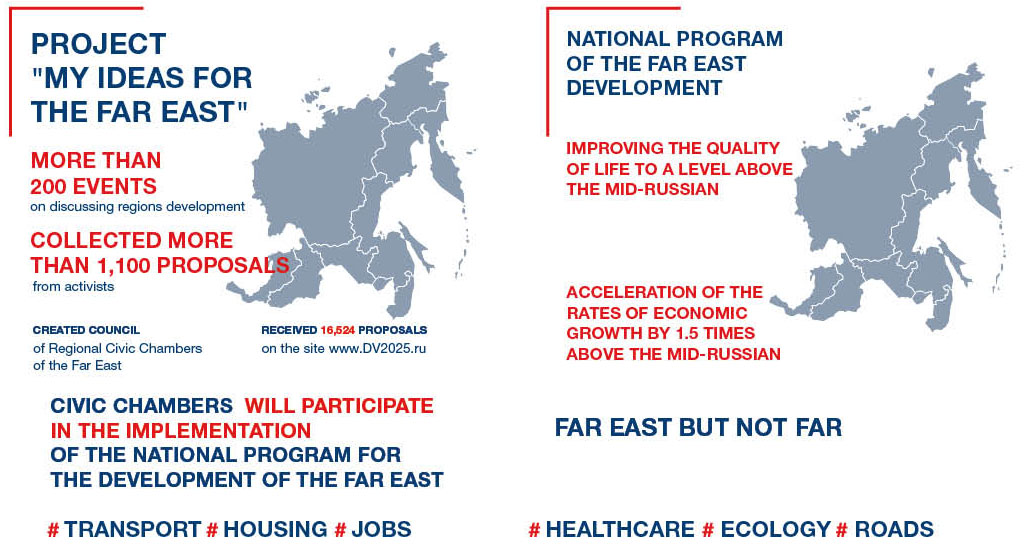
Opinions of citizens, commercial organizations and public associations formulating proposals for inclusion in the national program were collected with, an inter-chamber project, which was launched to interact with the authorities in the development of the National Program for the Development of the Far East for the Period until 2025 and for the Future until 2035. This inter-chamber project was called "My ideas for the Far East". With the support of the Civic Chamber of the Russian Federation, a Council of Civic Chambers of constituent entities of the Russian Federation in the Far Eastern Federal District has been created. The first presentation of the social block of the National Program for the Development of the Far East for the Period until 2025 and for the Future until 2035 was held as part of the "Community" forum in Ulan-Ude.
This is an important new practice of engaging organized civil society institutions represented by regional civic chambers to the development of strategic decisions in the framework of national projects. This experience can be an important example of constructive and working interaction between institutions of civil society and the state.
#Public activity and development of rural territories
The Civic Chamber associates great expectations with the support of initiative projects of local communities. A significant part of the funds of the State Program for the Development of Rural Territories is supposed to be directed to the implementation of initiative projects of rural municipalities, businesses, individual residents and their groups. However, there still remain preoccupations that when allocating funds, preference will be given to settlements having jobs and a higher proportion of extra-budgetary co-financing, which can lead to a relapse of the Soviet epic of eliminating unpromising villages.
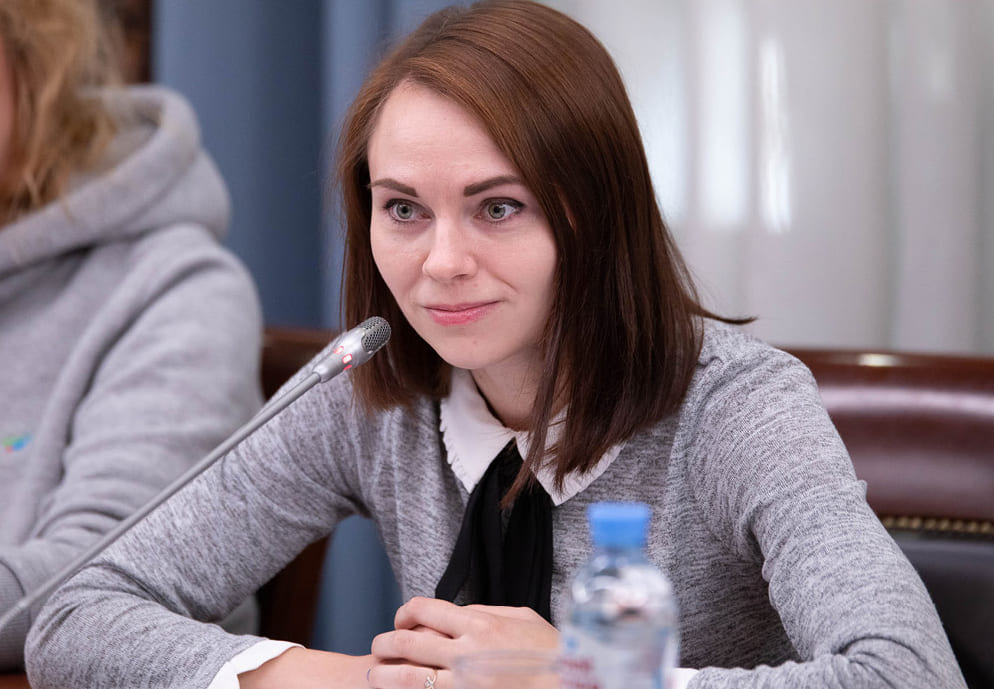
In the first place, initiatives aimed at building human resources (career guidance, education, employment, etc.) and improving living conditions (housing, infrastructure, social services, etc.) in the countryside, as well as changing the structure of rural employment, supporting alternative (agriculture) areas of employment, e.g. agritourism. Such initiatives were proposed in the framework of the project of the Civic Chamber, All-Russia People’s Front and the Russian Union of Rural Youth named "Incubator of rural initiatives". Under the guidance of a professional tutor and with the help of attached mentors, teams from 60 regions of this country worked out and implemented projects for the comprehensive development of their rural community. The best of them were introduced at the Village Initiatives Forum as part of the Russian Agricultural Exhibition "Golden Autumn 2019" and will receive support under the State Rural Development Program.
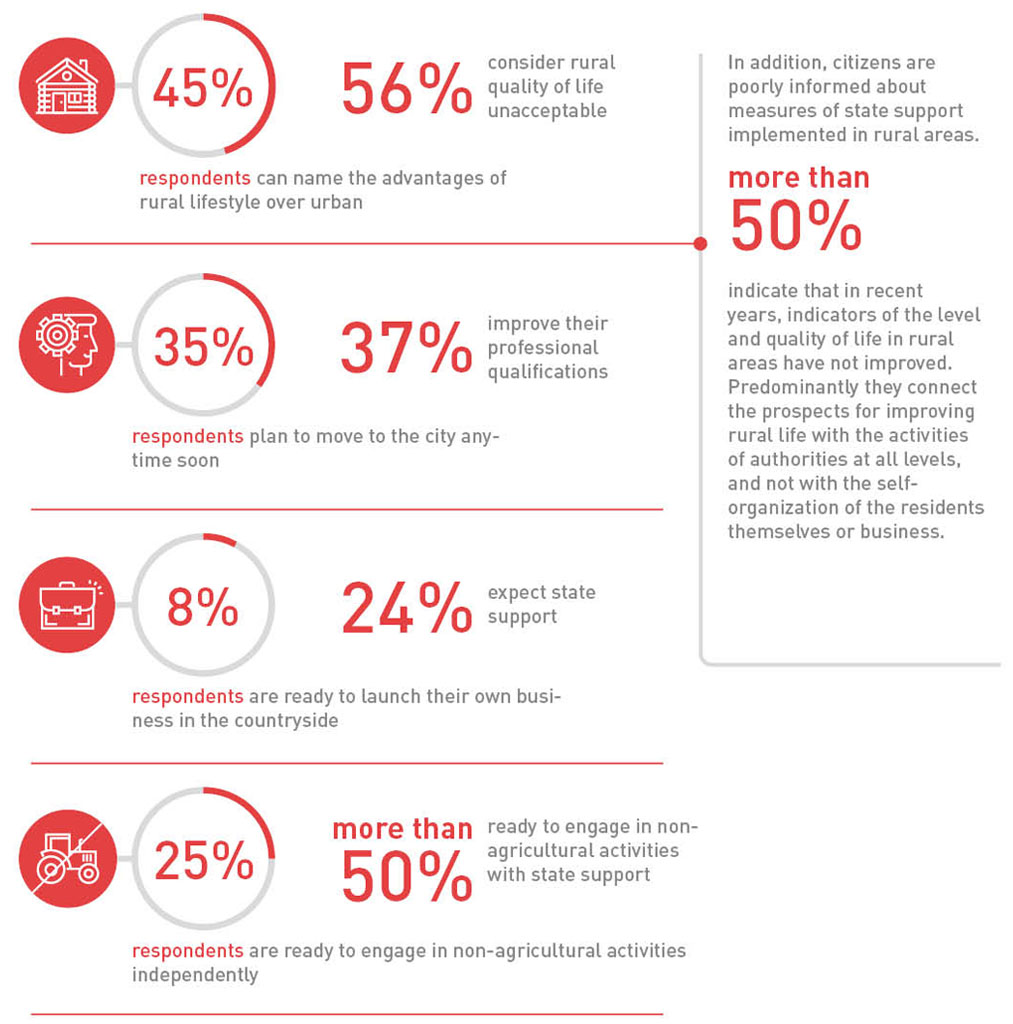
Following the monitoring of the Civic Chamber on the standard of living, the status of the social and engineering infrastructure of rural settlements within the framework of the Civic Chamber's project named "Village Standard", as well based on proposals received from the regions, the State Program for the development of rural areas was supplemented in terms of implementation of integrated settlement projects sites for the development of compact housing in rural areas.
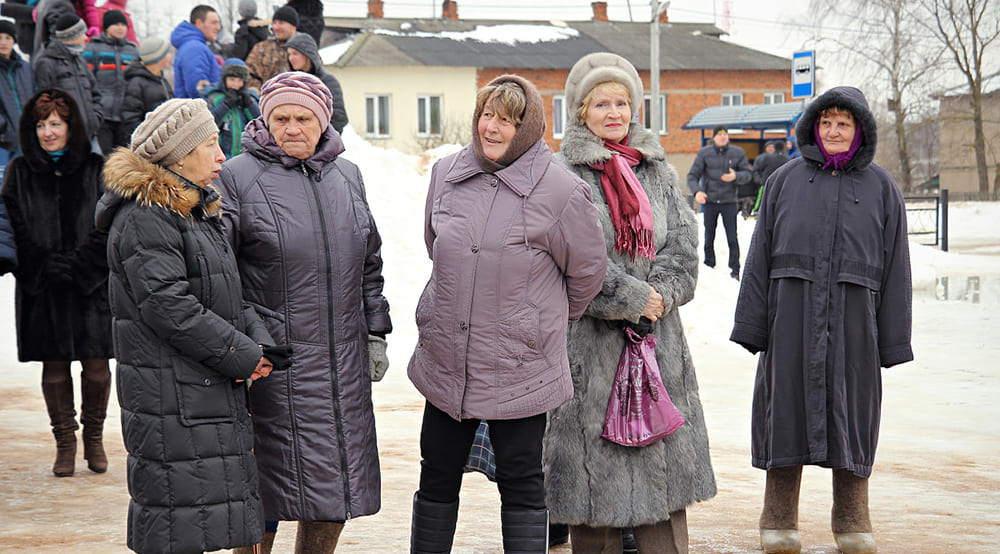
The Civic Chamber of the Russian Federation, together with the Russian Union of Rural Youth, conducted an all-Russian survey on rural employment and the development of human resources in rural areas. According to the survey, the level of social optimism regarding rural life remains low; a negative assessment of the quality of life prevails.
In a letter to the Russian Ministry of Labor, the Civic Chamber drew attention to additional incentive measures for moving to rural areas and employment, such as the introduction of a shorter working day for women living in rural areas. The proposal was heard, and guarantees to women who live and work in rural areas, in terms of reducing working hours, as more than 36 hours a week, were enshrined in the federal law in 2019. Now it is important to clarify what is meant by the countryside, because there is no such term in the law. It is also important to understand what is meant by a place of work in rural areas. The Civic Chamber proposes to determine such places of work not at the place of registration of the legal entity, but at the actual location of the enterprise.
The Civic Chamber paid attention to sectoral problems of agricultural development. In particular, the Civic Chamber’s negative response to the Law “On the Development of Viticulture and Winemaking in the Russian Federation” allowed protect the interests of farmers, winegrowers and winemakers.
In general, the development of rural territories cannot be considered only in strict connection with the development of agricultural, processing and related industries, but much more broadly, including in the context of ensuring the national security of this country, as an important element of land retention. The Civic Chamber's report named “How to save the village: problems of population employment”165 provides measures for the integrated development of rural territories and the prevention of population outflow to cities.
#Intellectual heritage for future generations: development of education and science
A large number of measures are being taken in this country aimed at improving the education system, consolidating pedagogical and scientific-pedagogical personnel in the educational system, raising the status of teacher and scientist in society. And the public is actively involved in monitoring their implementation. Since 2018, the "Education" national project , the "Development of Education" State program for 2018-2025, which includes 10 federal projects, have been approved and implemented. To evaluate the implementation of the “Science” national project and the “Education” national project, the Civic Chamber of the Russian Federation held thematic round tables.
In January – February 2019, the Civic Chamber conducted a survey on the status of a teacher in modern society in the context of the "Teacher of the Future" federal project, which is one of ten in the "Education" national project.166 The survey showed that, despite the measures taken by the state, the prestige of the teaching profession in society remains low (71% of answers) and even continues to decline (81%).167
What is the reason of the existing attitude of society towards the teacher? The survey showed that the low status of a teacher in society is due to a combination of reasons, and among them in the first place are “excessive teaching load” and “a large amount of reporting”.
In St. Petersburg based on the oldest pedagogical university of our country, St. Petersburg Pedagogical University named after A.I. Herzen, together with the Committee on Education of St. Petersburg and the Federal Educational and Methodological Association for Teacher Education in August 2019, the Civic Chamber held public, as part of the development of the topic of staffing of the education system, on the theme “Mission of teacher training universities and the system of continuing teacher education in the implementation of 'the Education' national project: “preparation and support of the teacher’s activities and the problems of the development of pedagogical technologies in the context of the school of the future”.168 Dozens of regions of the Russian Federation showed interest in public hearings, and those who wanted to participate had to be placed in three streaming classrooms of the university. The online meeting joined representatives from the Krasnoyarsk and Khabarovsk Territories, the Republic of Komi, Saratov, Vologda, Pskov, Ulyanovsk, Leningrad and other regions of Russia.
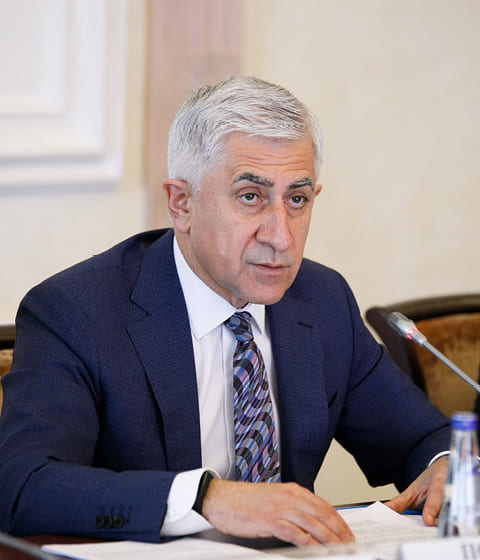
Assessment of prestige of teacher profession today
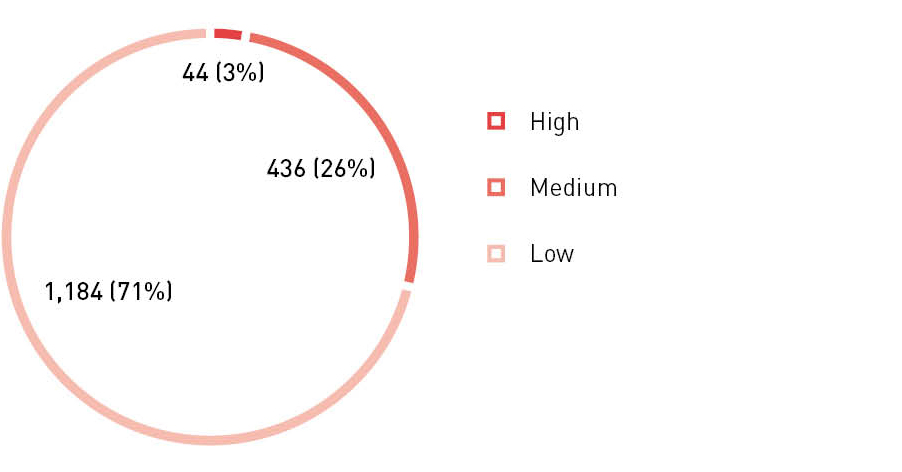
Source: The Civic Chamber of the Russian Federation
Experience with teachers' negative professional behavior
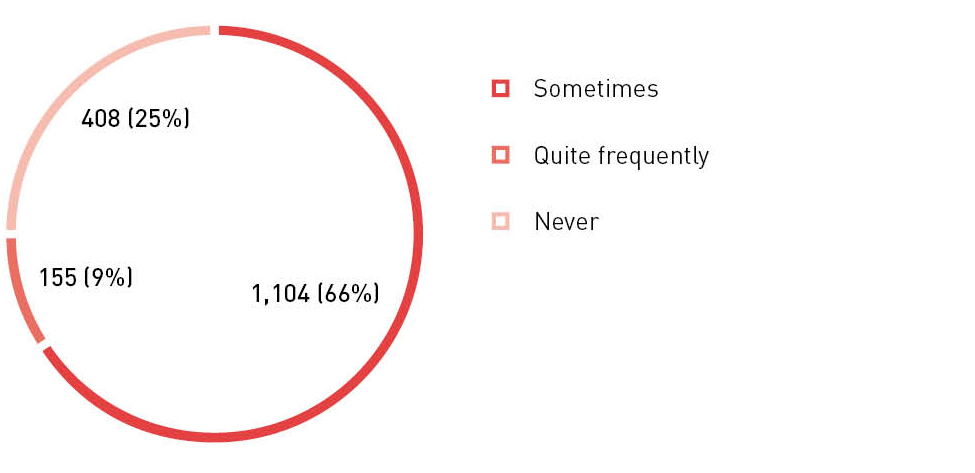
Source: The Civic Chamber of the Russian Federation
Constant monitoring of public opinion on the problems of the implementation of the "Education" national project ("Teacher of the Future" the federal project ) allows not only to send recommendations to the executive authorities on the implementation of national projects, paying attention to bottlenecks in their implementation, but also to keep in view the solving of urgent problems of high-quality staffing in various fields of activity, including education and science.
EDUCATIONAL STANDARDS
On April 24, the Civic Chamber of the Russian Federation held a discussion on the bill of Federal State Standard for Basic General Education (FSS BGE). This document has been expected by society, school system and the parent community of this country. It is aimed at organizing the educational (training and education) process in grades 5–9, creating textbooks, and implementing in-process and final control. The bill of FSS BGE has caused an active discussion in the society, especially regarding the prospects for the development of the national school, the possibility of fulfilling the goals and objectives set in the “Education” national project.
To identify points of view and opinions of the broad segments of the population on the prepared document, the Civic Chamber conducted an online survey from April 10 to 25, 2019. It involved 16 thousand people from 70 constituent entities of the Russian Federation. Most of the respondents are sure that the proposed version of the FSS BGE preserves the fundamental nature of education and does not prejudice the orientation towards an activity approach in school education.169
The majority of respondents do not question the very fact of the need of FSS BGE as a form of expressing state requirements for the content of education, the results of personal development and education, staffing and material and technical support of the educational process at all levels of school education: 53% say that standards are necessary, 36% say that they are most likely necessary, and only 10% of respondents doubt the need of this document.
The majority of respondents (53.3%) see a direct correlation between the quality of FSS BGE and the quality of school education. The public also paid attention to other current problems. On January 14, 2019, the Civic Chamber of the Russian Federation addressed the problems of labor training and education in the general education system; March 26 – engineering training for schoolchildren; April 22 – the role of reading and literacy for the education of a successful individual. Contests in support of new teaching methods are of great importance. In 2019, a significant number of such regional and all-Russian events were held. For example, a large number of participants were attracted by the Competition for Innovation in Education, which was actively promoted by the Civic Chamber of the Russian Federation. In October 2019, the final stage of the All-Russian contest “Teacher of the Year of Russia” was held, the host of which is the Ministry of Education of the Russian Federation with the support of the Civic Chamber; in November 2019 summed up the results of the all-Russian contest “Golden Names of Higher Education”, aimed at improving the status of the profession of a teacher of higher education. Also in October, the Civic Chamber summed up the results of the All-Russian contest “The Best Inclusive School 2019”, which evaluated achievements in the field of implementing inclusive education.
What role do you think federal state educational standards (FSS BGE) play for the school? Please tick three most important roles.
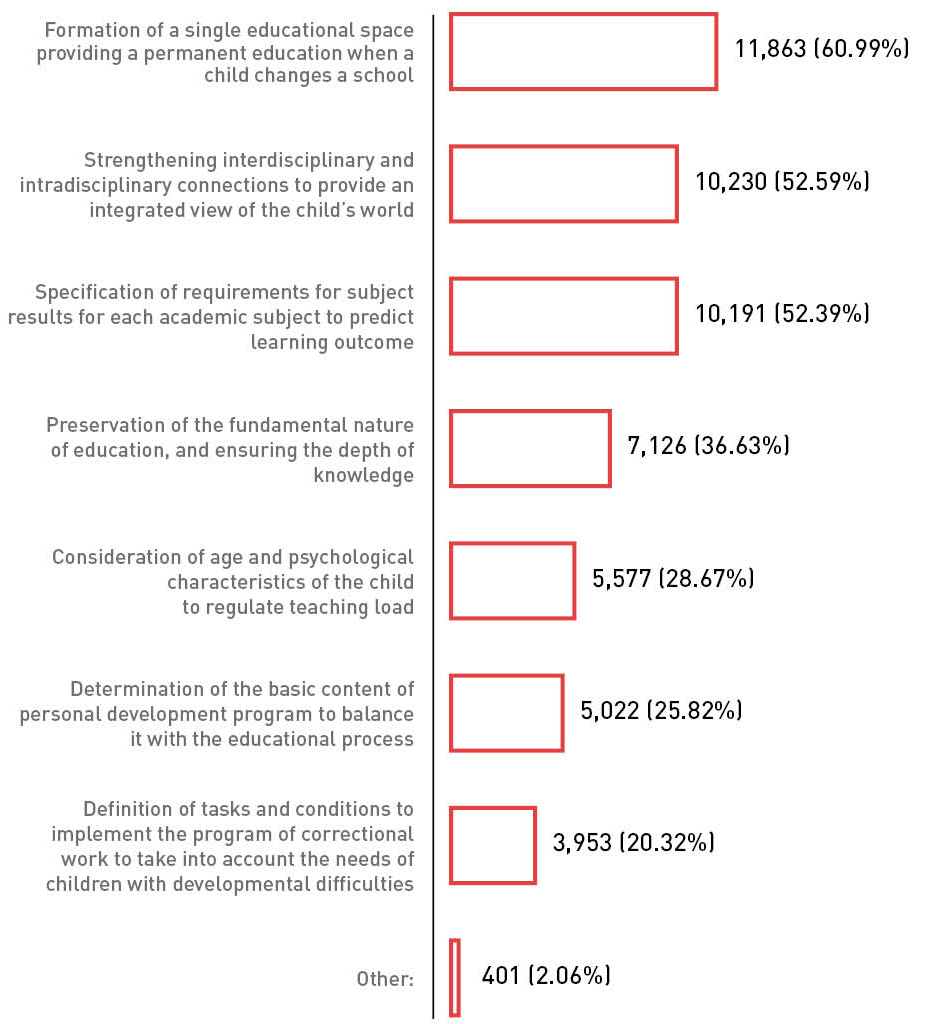
Source: The Civic Chamber of the Russian Federation
The goal of all these efforts is clear: create a competitive education system that can try to enter the top ten in the world, build an education system that would cover the younger generation, starting from preschool.
Do you think federal state educational standards are needed in school? Please choose one answer
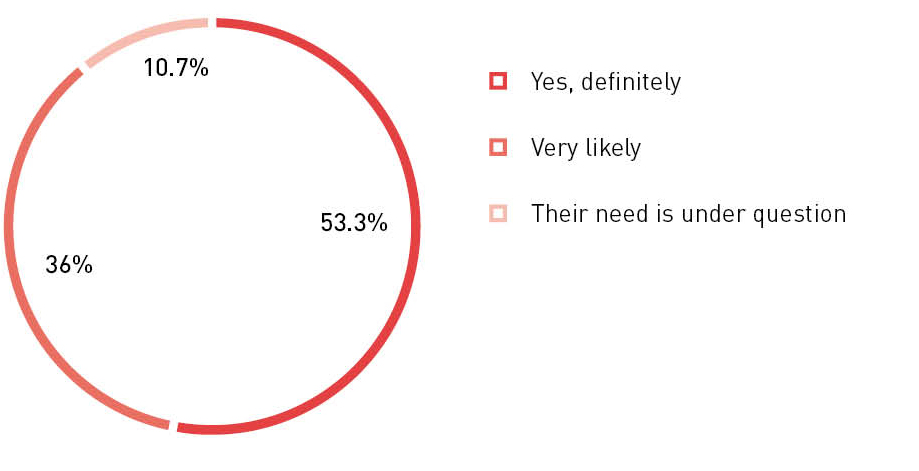
Source: The Civic Chamber of the Russian Federation
MONITORING Unified State Exam
The tone of the discussion around the implementation of national projects, as well as improving the global competitiveness of Russian education, the development of human resources, and the new challenges of education in the digital economy was set in February 2019 with the participation of the Minister of Science and Higher Education of the Russian Federation M.M. Kotyukov at the Professor's Forum 2019.
The number of students studying at the expense of the state continues to decline. If in 2018 in Russian universities had in total 597.6 thousand budget places, then in 2019 only 518.4 thousand. And this trend will continue in the future. And at the same time, there will be more and more people wishing to obtain a higher education. In 2018, 731 thousand people participated in USE, this year this figure increased to 780 thousand.170 The cost of paid education is growing, and this burden falls on the shoulders of the Russian families.
In September 2019, the Civic Chamber coorganized an annual assessment of results of the public monitoring called “Attitude of students, parents of students and teachers to the exam”. Over 84 thousand people from 85 constituent entities of the Russian Federation took part in the online survey. 57% of respondents believe that the exam does not provide an objective assessment of knowledge, and 41.2% believe that the form of certification established in the last decade reduces the quality of education, and almost a third of the respondents have doubted the social function of the exam as an instrument of ensuring the equality of prospective students.
Which of the following statements do you agree with?
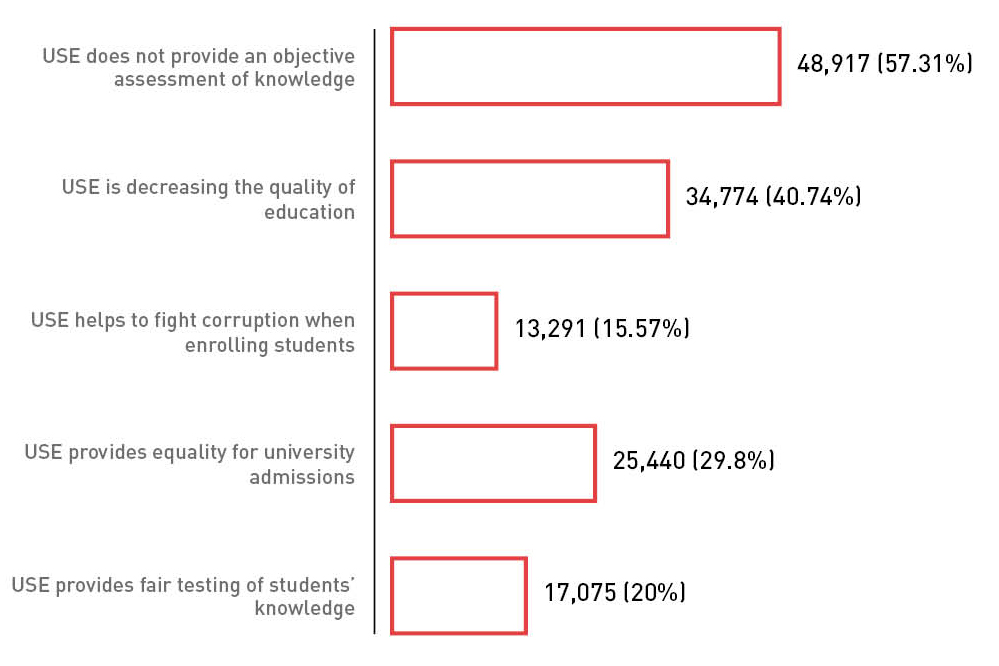
Source: The Civic Chamber of the Russian Federation
Experts are sure that obtained results allow to understand what should be improved in the USE system, as well as what needs to be done to improve the quality of systematic training of schoolchildren and teachers.
Nearly half of the respondents consider as an alternative to USE centralized final school exams together with centralized entrance exams taken by all universities (27.05%) or with separate exams at each university (22.36%) as an alternative to the exam. The decision in favor of individual exams for each school was chosen less often, both with centralized entrance exams in all universities (16.59%), and with individual exams in each university (16.66%). At the same time, 22% of respondents said that they did not see an alternative to the USE. The USE alternative in the form of a portfolio is discussed and has few supporters little over 10%. Probably, people do not believe in the objectivity and fairness of this form of knowledge assessment.
All these changes will have positive results solely under the successful post-graduate employment of graduates. A new environment of interaction between universities and enterprises is needed in order to prepare young professionals entering the labor market with practical skills in working with the company where they will work after their graduation.
#Cultural sphere in focus of civil society
Since 2019, the Russian Federation began to implement the large-scale «Culture» national project, designed until 2024. Along with it, the Strategy of the state cultural policy for the period until 2030 is being implemented.
The public considers that it is important to control the effectiveness of spending the allocated funds. This topic was discussed, on May 15, 2019 in a format of online meeting by the members of the Civic Chamber of the Russian Federation and regional civic chambers within the “Culture” National Project: Opportunities and Mechanisms of Public Control”, and also on that day the monitoring of the project implementation in regions was launched.
In 2019, the Civic Chamber of the Russian Federation paid a great deal of attention to issues of patriotism, the preservation of spiritual values and cultural heritage. Numerous events were aimed at these issues, which in 2019 were held by the Civic Chamber of the Russian Federation as an organizer and participant. On March 13, 2019, the Social Forum of Theater and Film Actors was held, and on May 30, 2019, the 14th “Cultural Heritage 2019” National Prize was awarded.
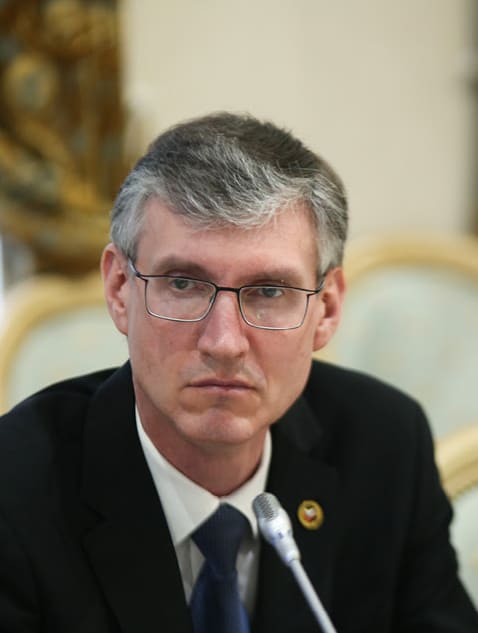
On May 20, 2019, two round tables were held in the Civic Chamber of the Russian Federation: “The development of modern Russian cinema through the creation of heroic-historical films: problems and development tendencies” and "Education of a harmoniously developed and socially responsible person on the basis of spiritual and moral values of the peoples of the Russian Federation, historical and national-cultural traditions". On June 18, 2019, another round table was held – “All-Russian Unity: the contribution of classical Russian culture”, which sparked great interest from representatives of various layers of the Russian public.
In 2019, the Civic Chamber introduced the project called "Living Heritage", which aims to combine information on key local cultural hallmarks of the regions.171 Well-known hallmarks of Russia, as well as unique cultural objects and practices, so far known only within one region or even a settlement, but having the potential to attract tourists from the most remote places, will be displayed on an electronic map. A special place on the map will be devoted to objects of intangible cultural heritage, including customs, traditions, myths and legends, original settlements, and gastronomic customs of the territory or keeping the memory of famous people or literary characters associated with this area.
An expert jury composed of leading Russian experts in the field of territory marketing, tourism development, and cultural heritage preservation selected 500 most significant local cultural brands in Russian regions. The selection process used a methodology that took into account the results of various ratings and competitions of cultural attractions of Russia, as well as the potential for promoting local cultural objects and practices at the national and global levels. In order to identify such cultural brands, several regions were visited by expeditions including federal experts, and accompanied by seminars and project sessions that were held in small towns and historical settlements. The resource provides an opportunity for anyone, either a traveler or a representative of the sphere of culture and tourism, to participate in replenishing the cultural brands card, scoring the brands available on it, as well as preparing tourist routes.
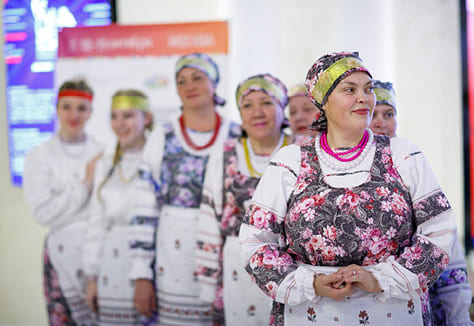
The similar tasks of promoting local brands are set by Learn Russia project.172 It brought together volunteers and professionals who created music videos and articles, including on Wikipedia, dedicated to the sights of the Rostov Region, the great poets and writers born in the Don. The results of this work were summed up at the first International Congress of Culture and Media Volunteers in Rostov-on-Don, which attracted more than a thousand people, including from other countries, on their sites and introduced them to local brands in the region.
In 2019, the long-awaited and important for the cultural sector legislative changes in the field of procurement were adopted. Based on the Federal Law of May 1, 2019 No. 70-FZ “On Amendments to Articles 1 and 8 of the Federal Law “On Procurement of Goods, Work and Services by Certain Types of Legal Entities” and the Federal Law “On the Contract System in the Sphere of Procurement of Goods, Work and Services to Meet State and Municipal Needs”173 the right of the customer not to give a justification in the information system in the field of procurement on compliance with prohibitions, under regulations of the Government of Russia, of import or restrictions, of goods originating from foreign states, as well as work and services, respectively performed or rendered by foreign persons, if allowed by such acts.
The amount within which cultural, scientific, educational, and sports organizations can purchase from a single supplier increases from 400 to 600 thousand rubles. Hence, the annual volume of these purchases should not exceed 5 million rubles, or 50% of the total annual purchases of the customer should not be more than 30 million rubles.174
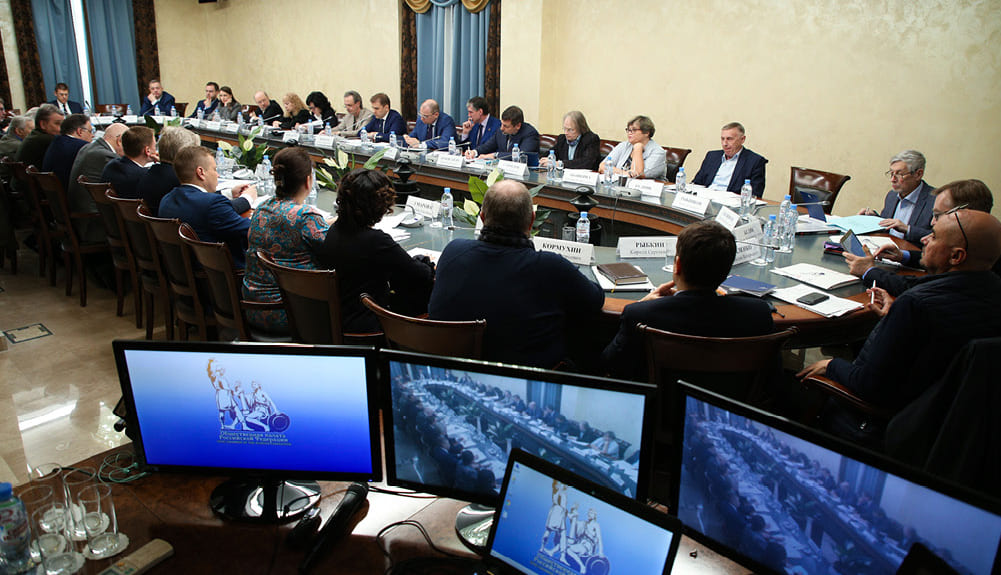
In 2019, the Civic Chamber held a discussion on the new concept of the federal bill “On Culture”. The concept of the bill provides several interesting innovations, in particular, co-financing of cultural events from budgets of various levels and the creation of a presidential fund for the development of culture and its branches in federal districts, as well as additional support for professional art organizations by financing individual targeted programs. When discussing the bill concept, cultural figures raised traditional issues of their concern.
In particular, they hope that the new law on culture will make it possible to bring creative activity out of the scope of public procurement legislation, reduce the level of direct participation of the state bureaucratic bodies in resolving issues of cultural activity, and find a more effective balance between creative freedom and the artist’s responsibility. The most acute is the question of the practice of state regulation of cultural policy and in this regard, the definition of forms of cultural life of those who need state support, and those acts of creativity that cannot be supported by the state. Within this context, the Civic Chamber recommended turn back to the question of distinguishing administrative, economic and creative activities of cultural institutions. Moreover, it is proposed to exclude the possibility of property priority over the right of society of preserving cultural heritage.
